Our bikes were stowed, all other departure prep was complete, and I steered us out of Labuan Marina early on a rainy mid-December morning. We were on our way to Brunei again. Muara, means ‘estuary’ in Malay and is located in Brunei’s northernmost district. This visit would enable us to get another 3 month Malaysian visa once we had checked in and out. After anchoring opposite the ferry terminal, our first task was to gather up all the relevant papers and documents ready for presenting to the authorities. It was just after midday by then and in a lull from the rain, it was inevitably hot and humid. The place was eerily quiet and I hadn’t seen anyone moving around on the nondescript coastline during our approach. I had read more about Brunei’s customs and culture during the journey as there was a possibility we might stay long enough to explore the town. Reading from another very out of date travel guide (Lonely Planet Guide, 2001), acquired from the ‘book swap’ facility in Labuan Marina I learned that:
- it is not customary to shake hands with people of the opposite sex (the action requires you to lightly touch the other hand and then bring your hands closely to your chest)
- casual touching in public is frowned upon
- pointing must be done with the thumb, not the forefinger
- special officers prowl the streets after dark looking for unmarried couples standing or sitting too close to each other
- and, of course there is a requirement to dress respectably.
The risk of committing one or more of those social faux pas made me slightly nervous, although the concluding sentence provided some reassurance: ‘Bruneians are generally reserved in public and are polite and hospitable, and not all are as zealous as the government’. I’m not sure if all of that still applies, but it’s still a fact that Brunei’s citizens enjoy enviable patronage. There are pensions for all, free medical care, free schooling, free sport and leisure centres, cheap loans, subsidies for costly purchases, short working weeks, no taxes and a high minimum wage. The sale of alcohol is still banned, however.

Suitably attired, we got in the dinghy and set off towards officialdom. We tied up at the bottom of a flight of steps, watched by a couple of uniformed guys on the jetty above. We entered a cool, quiet and seemingly empty building, with a sign welcoming visitors to Brunei, along with one displaying the penalties for drug smuggling – death being one of them. There was a man sitting in a tiny office behind a glassed-off partition and Paul had to bend down in order to talk to him.
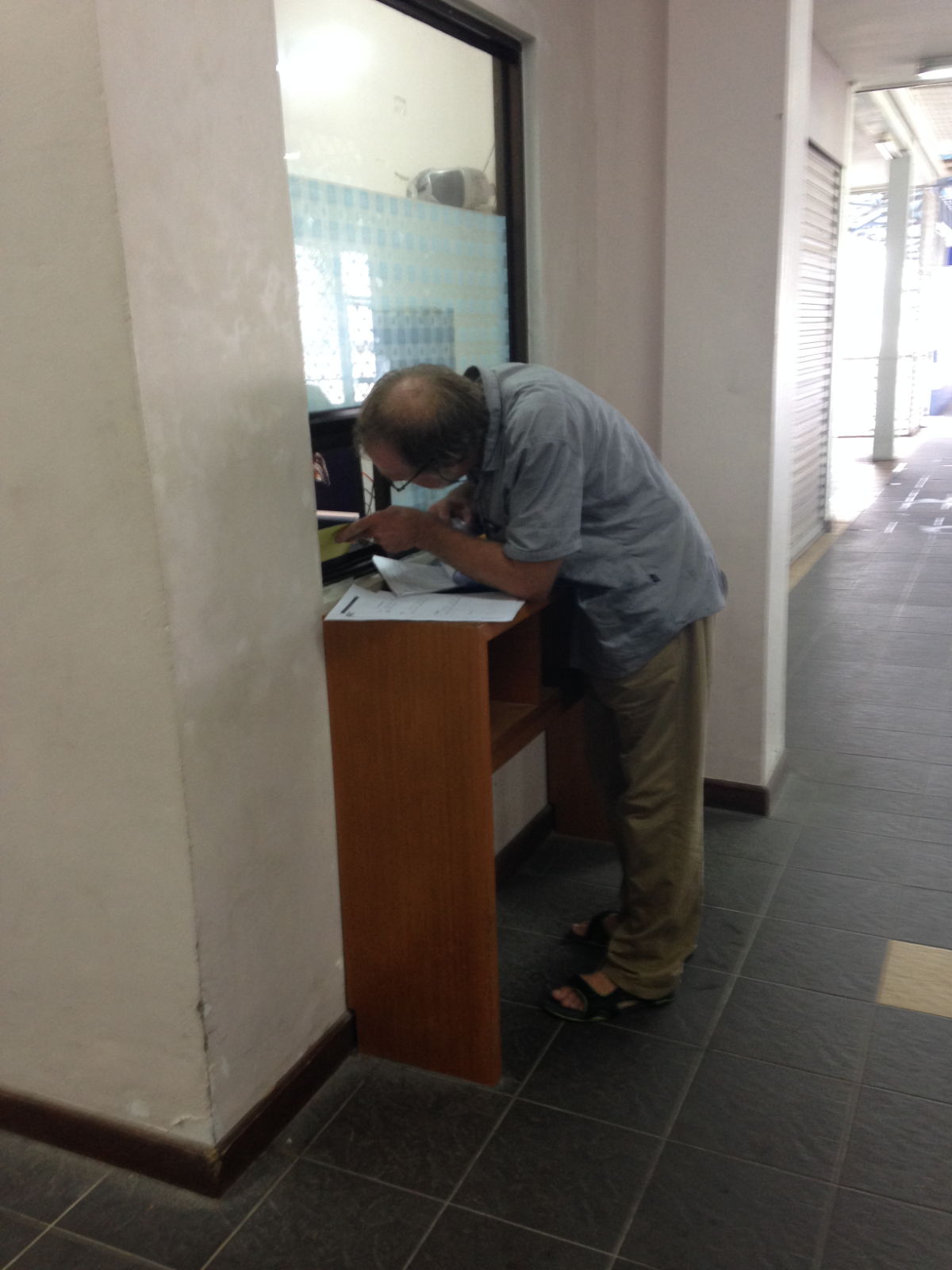
He told us that we would need to get cleared by the Health Officer first. No one was in that office when we knocked on the door, so we walked on and found the immigration office. The smell of food hit us when the door was opened in response to our knock and we could see a group of women sitting around a table tucking into what looked like a substantial feast. We were told that we would have to wait for the Health Officer to return before we could do anything else, and helpfully suggested we could fill in our immigration forms to pass the time. This filled ten minutes of the ensuing two-hour wait in the building, during which I read several chapters of my book, befriended the cat that was wandering around, went outside to see if anything was happening out there, then back inside to see if anyone had turned up, and played several moves on ‘words with friends’.
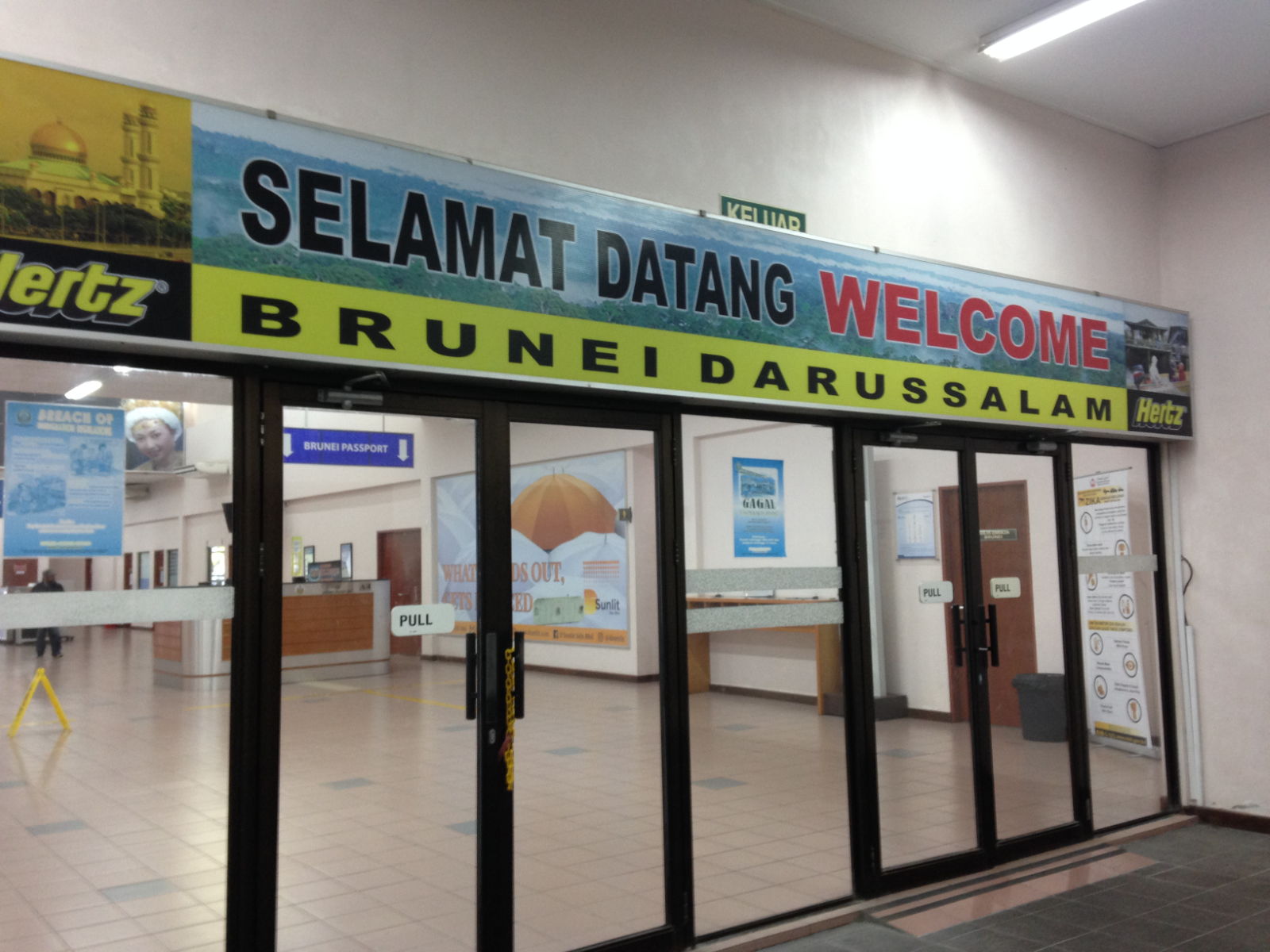
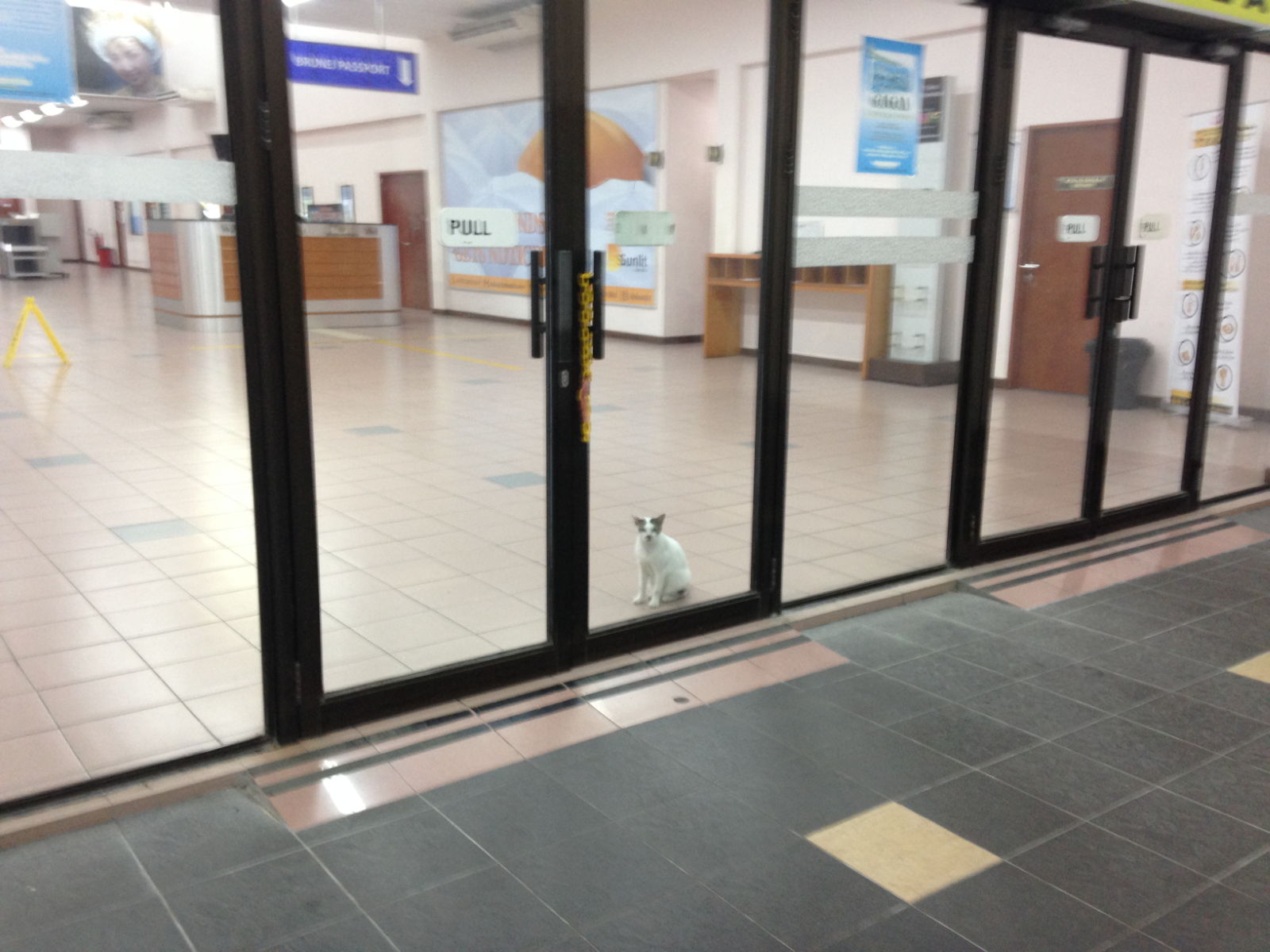
The place only sprang to life when the ferry was due and we realised we should have timed our arrival with that. The Health Officer appeared and dealt with us promptly (although she seemed to think we should have brought our own carbon paper to get duplicates of the paperwork – how remiss of us). At customs, we were asked by a rather dour man if we had alcohol on board and Paul told him we had two litres of wine. This caused a flash of irritation followed by a stern command to fill in a form to declare it. My heart was in my mouth at the thought that he might come over to inspect us! I was glad to exit that building, and once back on the boat we weighed anchor and motored on under the bridge – currently still under construction – with me steering I’m proud to declare. We anchored opposite the Yacht Club, which we’d been told served good food but neither of us felt inclined to go ashore. My impression of Brunei had got off to a less than positive start, and the town itself didn’t look very appealing. It didn’t take us long to come to a decision to check out the following day and head towards the Klias River.
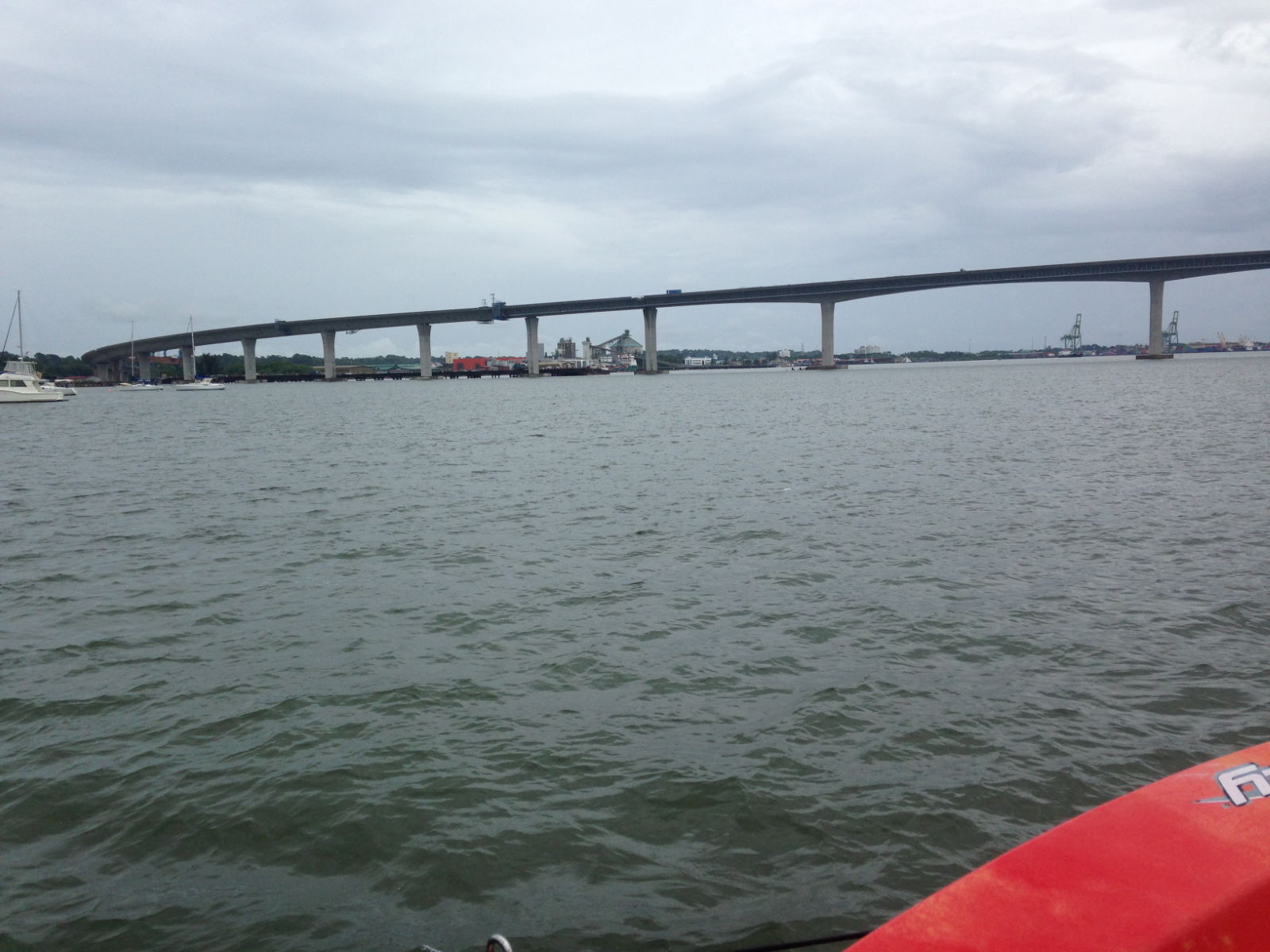
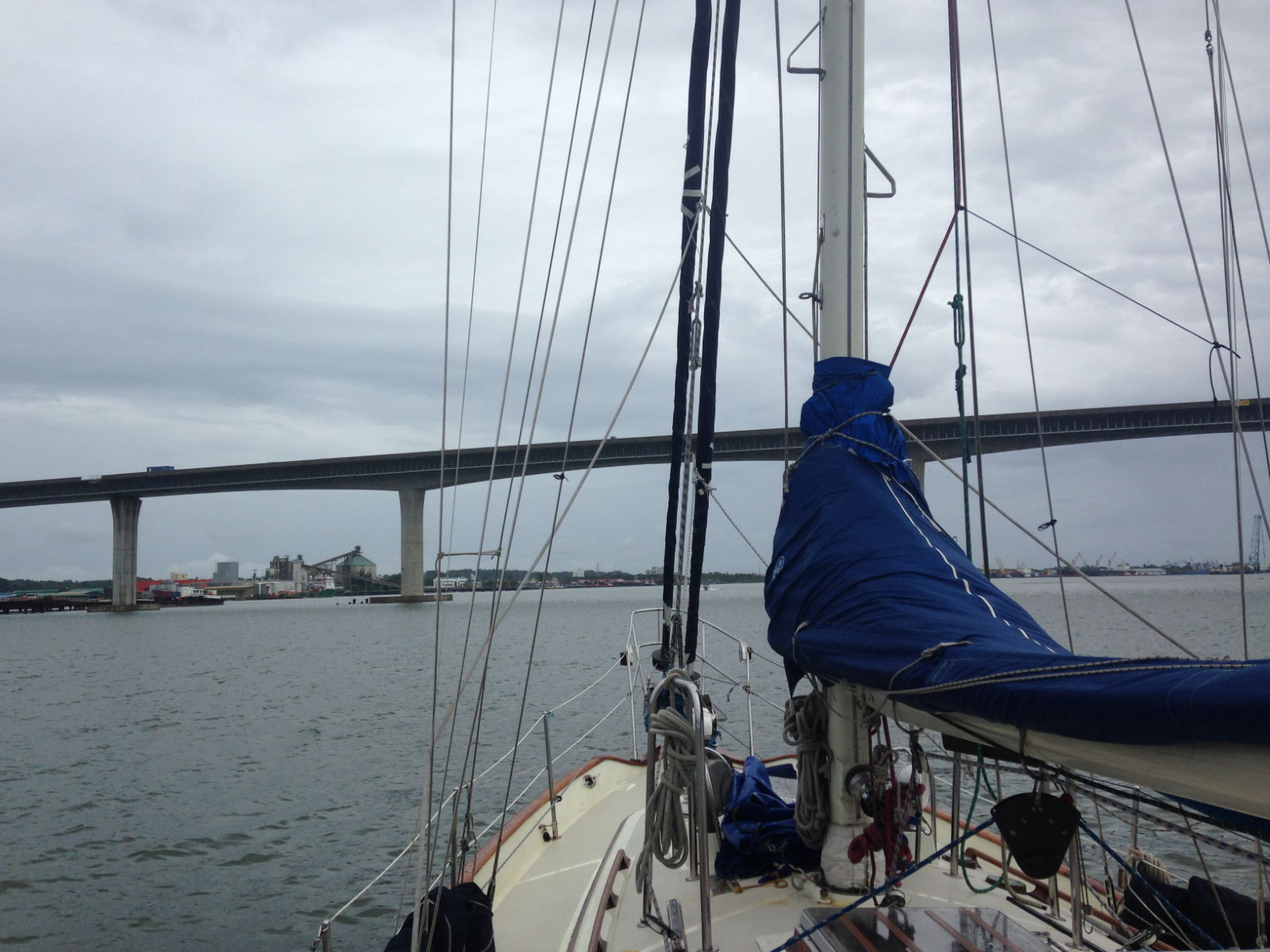
It rained all through the night and was still pelting down at 8am when we made ready to return to the ferry terminal for more paper pushing. It had all but stopped by the time we anchored in the same spot as the previous day. The checking out process was the usual chaotic confusion involving conflicting instructions, being passed from one place to another, being told that we should have done this or that first and confused looks from staff examining the stamped paperwork we had obtained the previous day. At one point we sat on some seats in a huge empty room while waiting for the immigration lady to appear, and a lady washing the spotlessly clean floor asked if we’d mind moving somewhere else because she needed access to the part we were occupying! The Harbour Master, behind the Perspex in the tiny office proved to be the most helpful, advising Paul what to do and say, and he smiled a lot too. Finally, once we were cleared and back on Sister Midnight, Paul called Port Control to inform them we were leaving and was reprimanded for being anchored in the way of the ferry’s route. It was definitely time to go. I took us out of the bay and into a sea heavy with swell. Rocking from side to side, it was tricky to keep the course. The autohelm did a grand job of staying on the track, though and took us most of the way to Klias. The water got shallower as we neared the entrance around 4 o’clock. We anchored in 6 metres of water, with a long, stilted coastal village on one side of us and mangroves on the other.
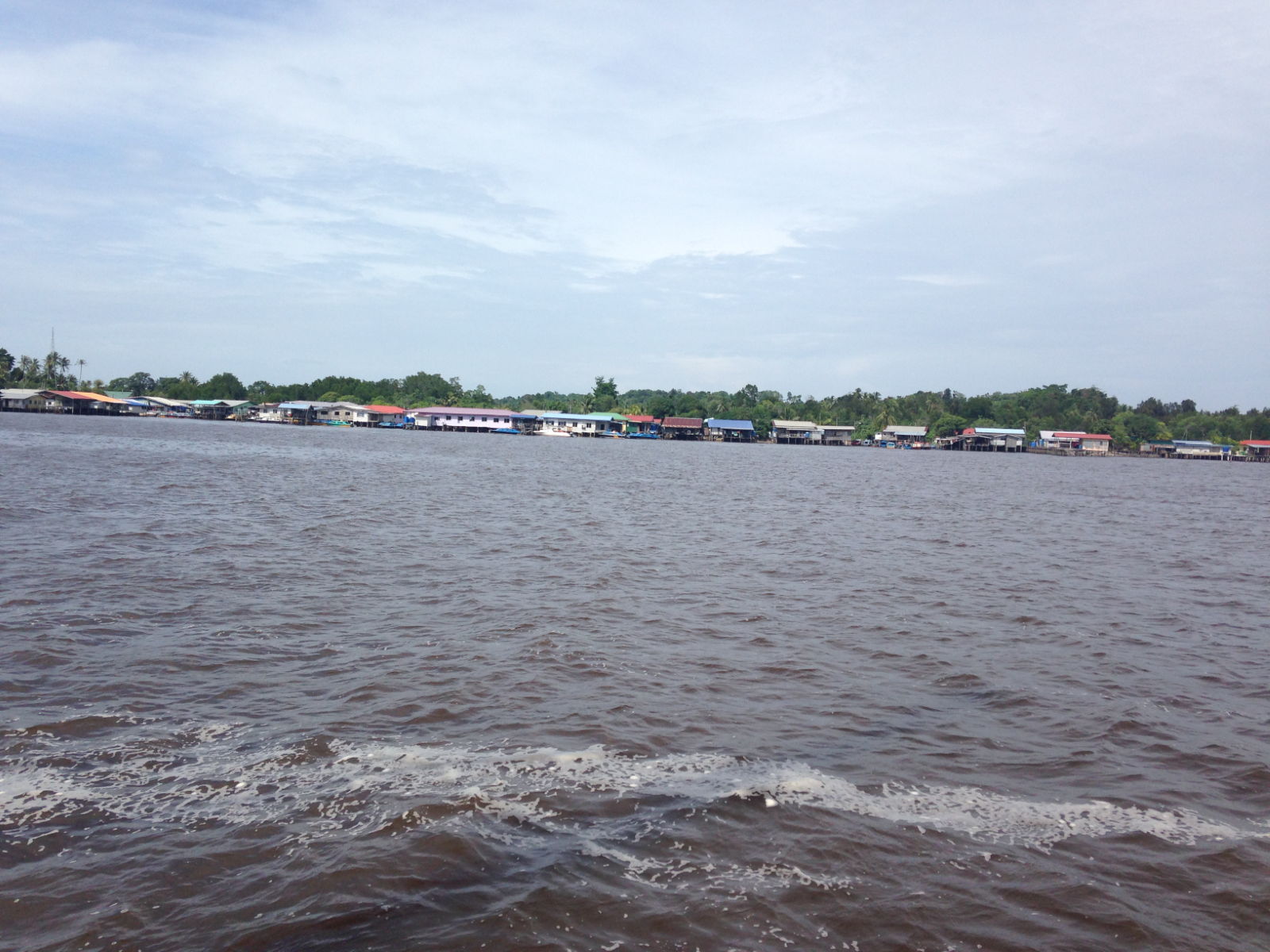
The cruising notes Paul used to get us here stated that we would quite likely get bitten by mosquitoes, and that we should expect nightly visits from flying ants. We lit an anti-mosquito coil in the cockpit to deter them. These round devices give off a pungent, incense-like smell and they seem to work well, although the ants weren’t too bothered by it. As it grew dark we could hear the mullah from the stilted village preaching earnestly over the mosque’s loudspeakers but apart from him it was blissfully quiet: a state I would come to appreciate more and more during our days on the beautiful Klias River.
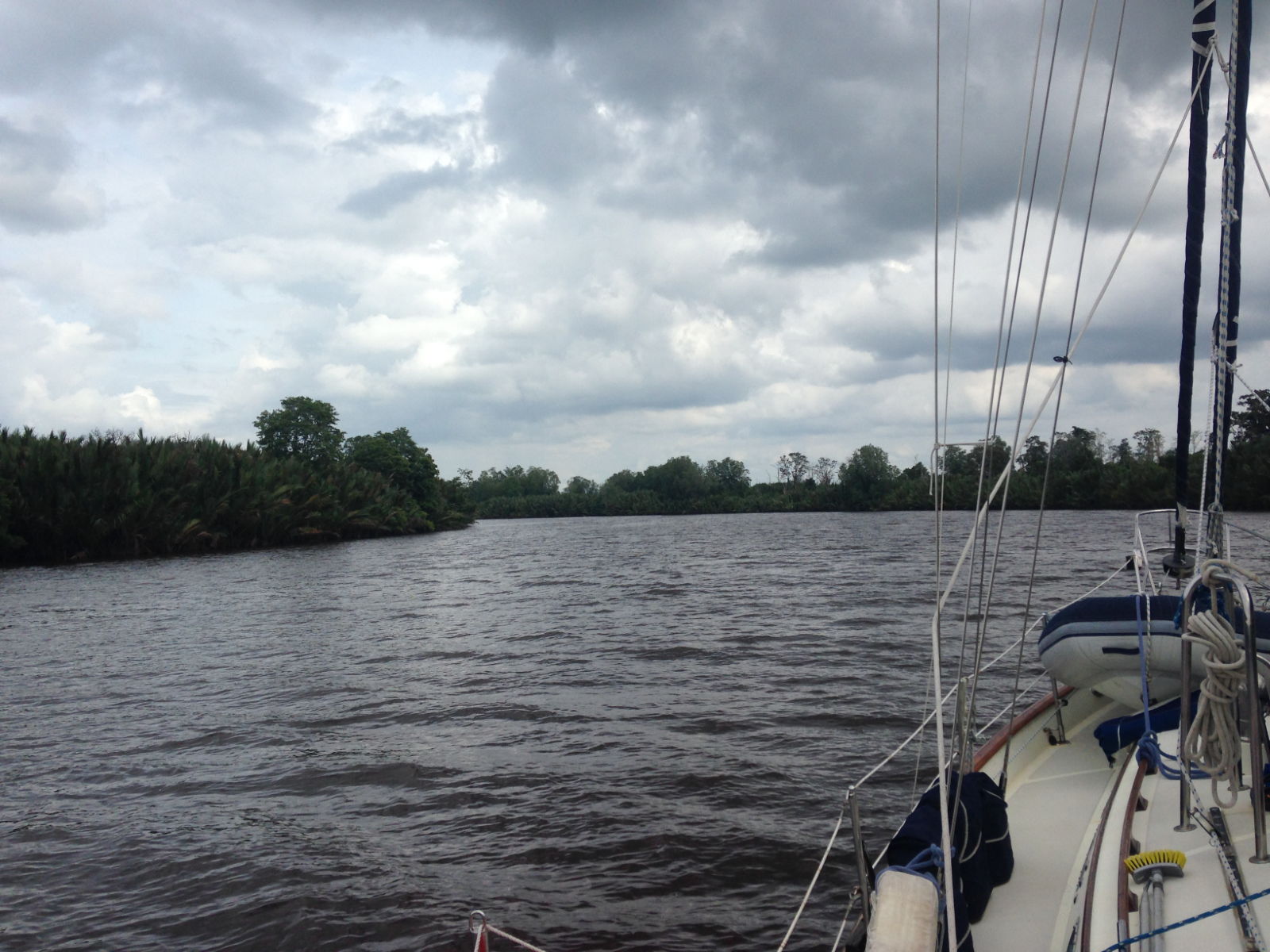
The River Klias
Gentle rocking ensured a restful night’s sleep and since we were in no great hurry to leave, we had a leisurely morning making the most of the internet in case reception was poor further on upriver. It wasn’t until 11 that I steered us around the island so that we were pointing in the right direction for the river trip. Initially, the water was alarmingly (for me) shallow but thankfully it didn’t go below 2.9 metres. The water was very still and brown in colour and I saw a few fish jumping (none of them were tempted by the lures Paul put out). It was humid on this overcast afternoon – hot when the sun broke through the clouds beaming straight into the cockpit at 2pm, forcing us to put cream on our feet and legs. We meandered along the bends of the river through largely unchanging scenery, while I kept my eyes peeled for proboscis monkeys.
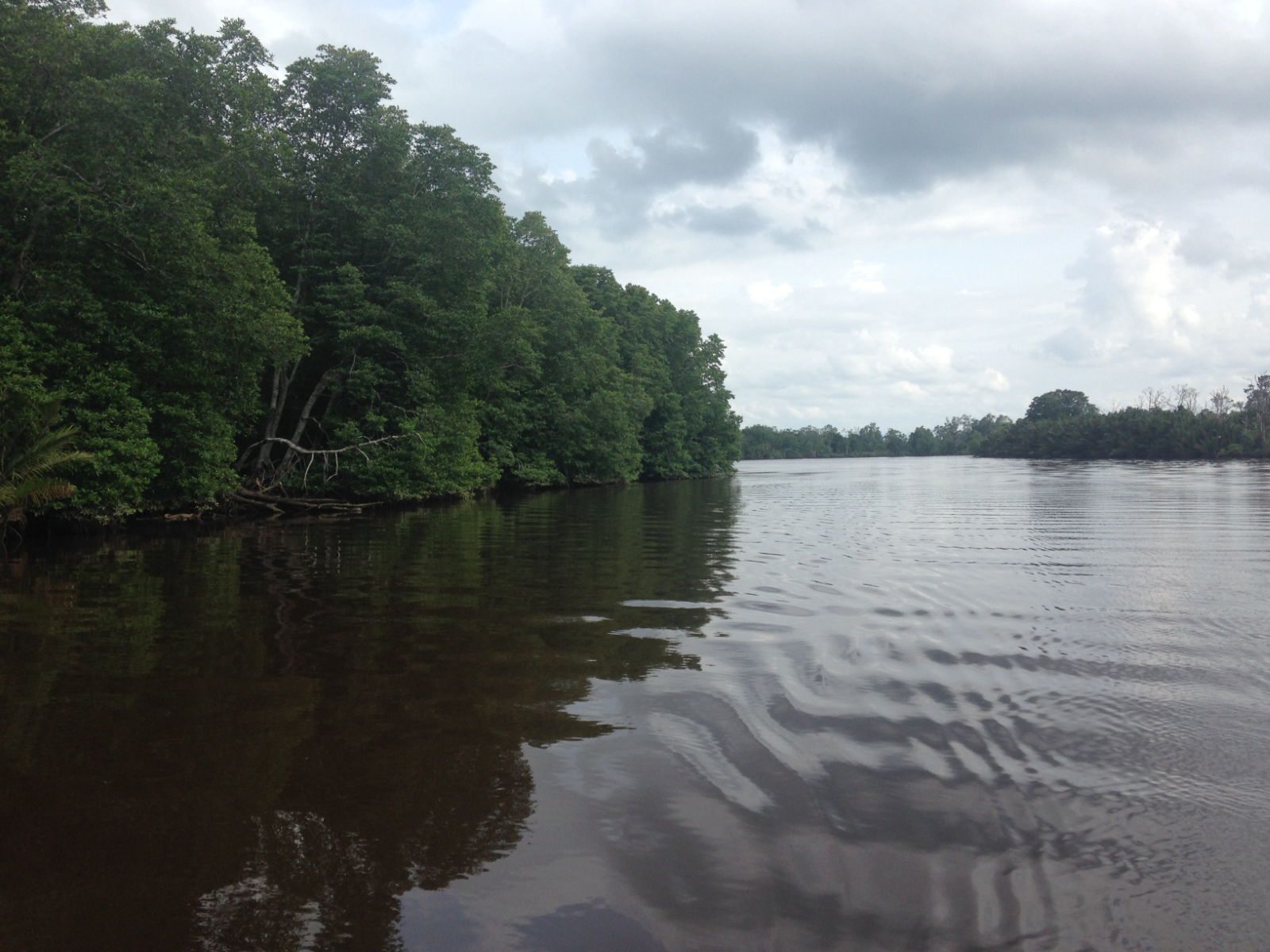
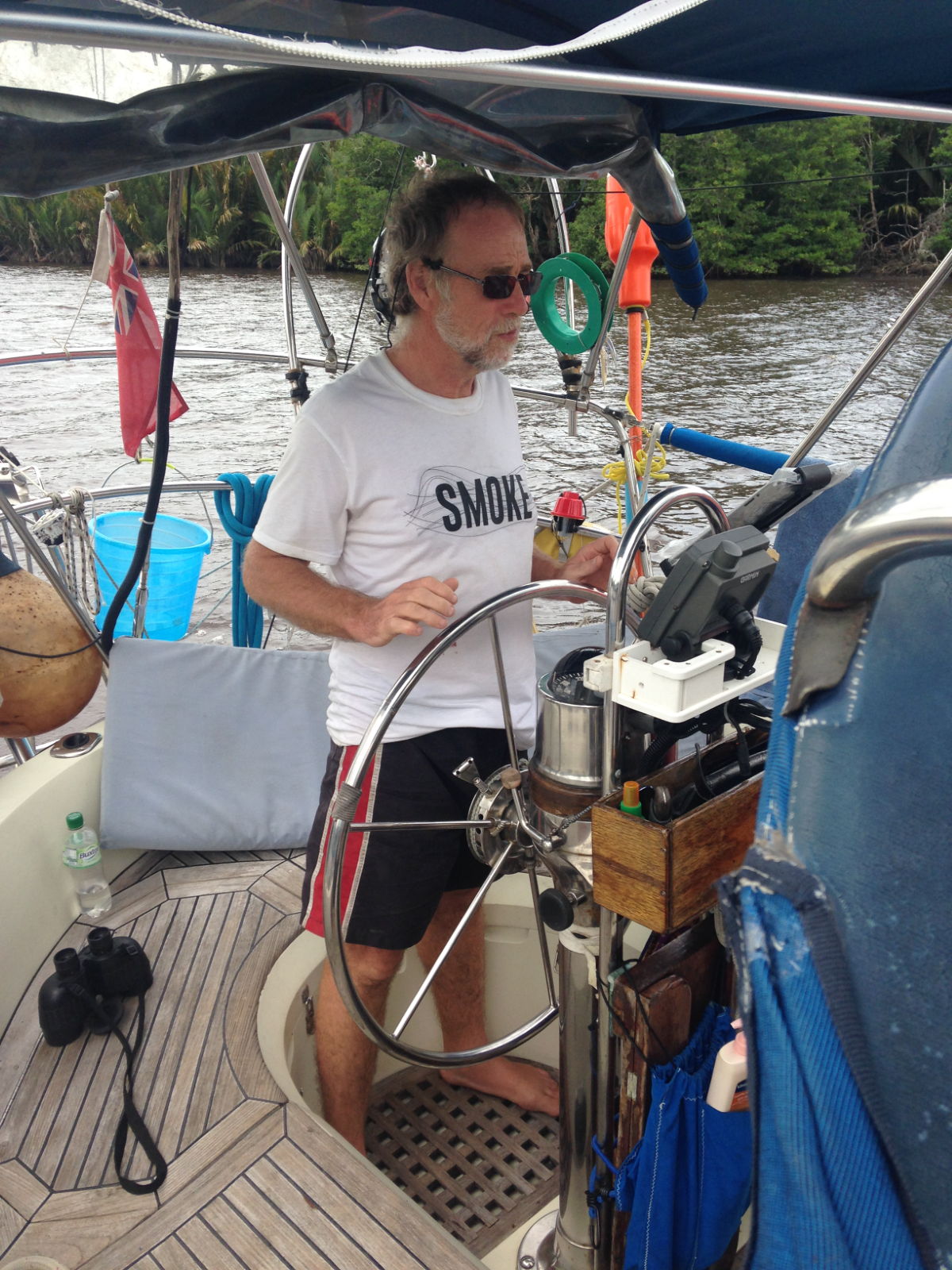
Klias National Park is one of only 16 protected areas in Borneo where this endangered species can be seen. Logging, palm oil plantations and hunting pose ongoing threats to their survival but in Malaysia they are protected by a number of conservation laws. The river became gradually narrower and the vegetation on the right hand side of its banks grew taller and thicker. The chirrup of cicadas and bird calls could be heard above the noise of the engine, which was on low revs for our slow journey so as not to disturb the monkeys. Several eagles soared above the treetops and it was while watching them that I caught movement in the trees to my right and was thrilled to spot two monkeys in the branches of a tree on the river’s edge. Their gingery brown colour and distinctive large nose confirmed they were proboscis. Notoriously shy, they weren’t in view for long unfortunately but we hardly took our eyes away from the banks after that. Later, we saw a tree full of them but they were further back and moved far too quickly to capture on film.
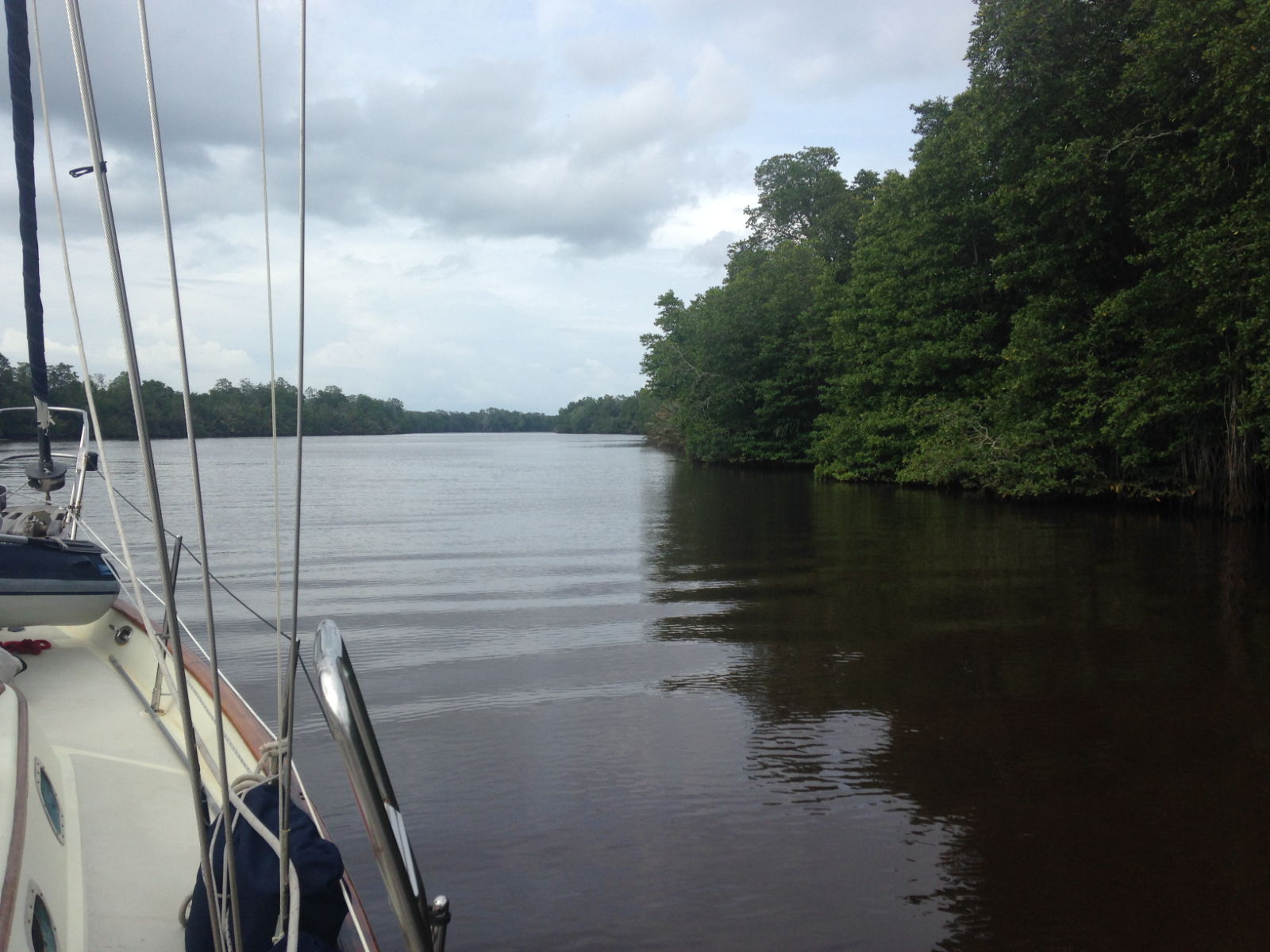
The further on we went, the murky water became more still and as afternoon began to turn into evening, it looked and felt terrifically atmospheric and tranquil to be in the heart of such natural surroundings. I couldn’t help but contrast it with the scenes likely to be taking place in Liverpool One in the frenetic build up to Christmas. We crossed paths with a couple of Klias River Tour boats – passengers and crew waving enthusiastically at the sight of at us. It wasn’t long before we reached the place they had clearly come from: a viewing platform with information boards on proboscis monkeys and other wildlife to look out for. A long, wooden platform had been constructed for people to stand quietly and attempt to spot them in their habitat. We began to see macaque monkeys as dusk fell. These are the more extrovert type and we’ve seen many on our travels. Unlike their more wary cousins, they appear to take pleasure in being seen, and will often approach people if they think they have food on them.
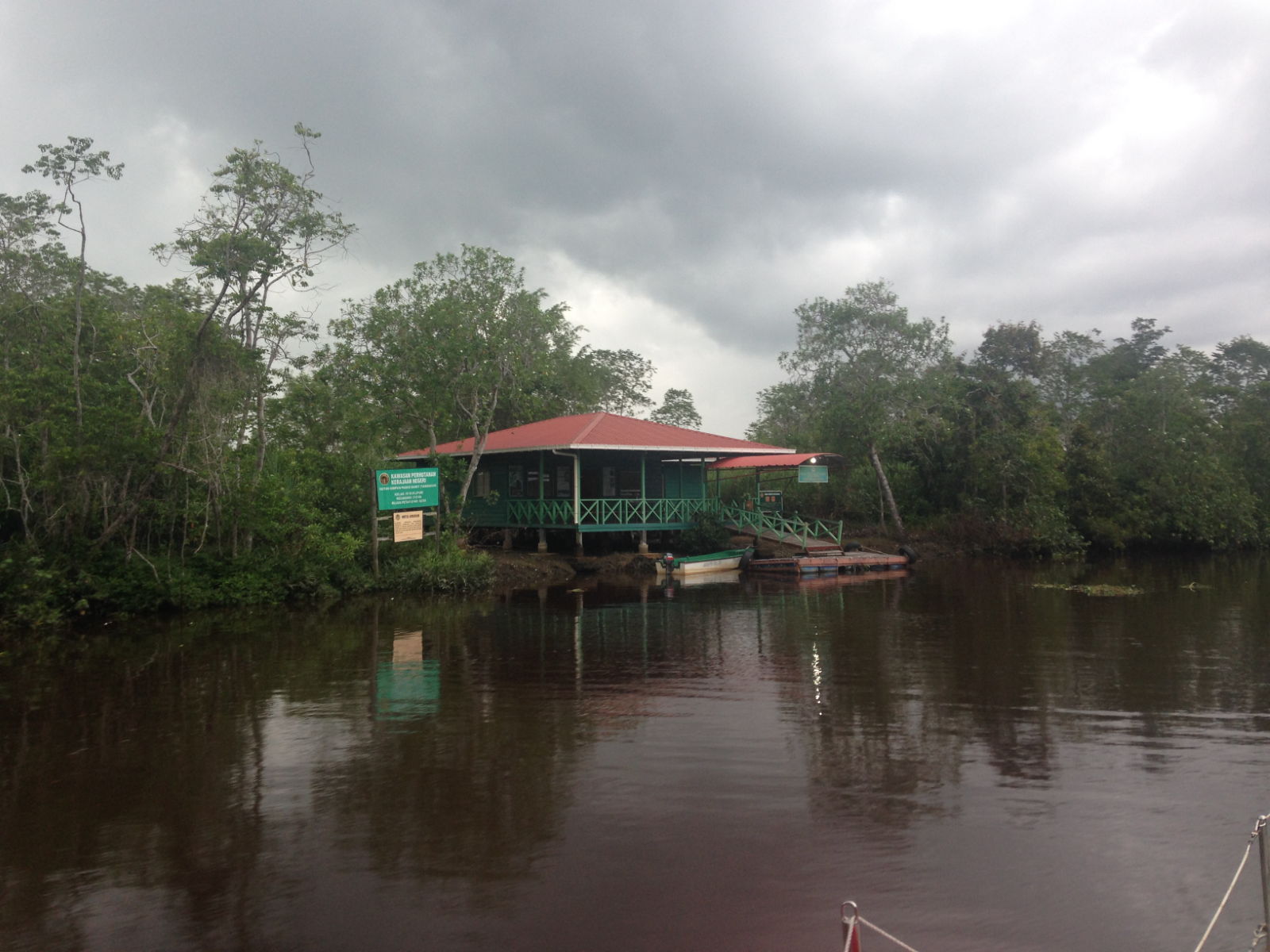
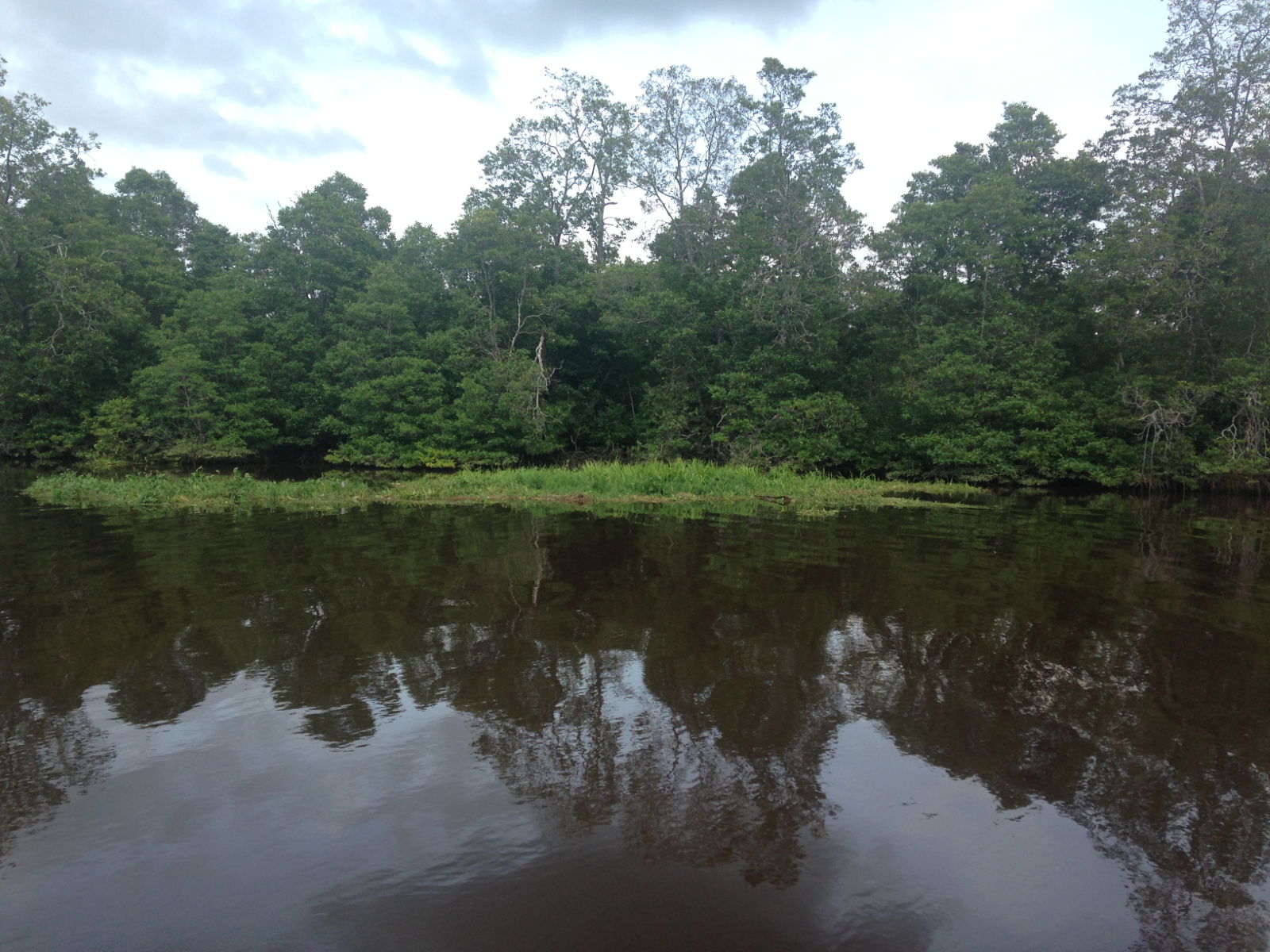
Darkness was fast approaching, rain was beginning to fall and we hadn’t chosen a place to anchor by 5pm. Paul was all for turning back to the viewing platform area but I was worried it would be too dark by the time we reached it. We ploughed on a little further in the fine drizzly rain until we found a suitable spot and dropped anchor in 12 metres of water that was so still there was no need for reversing to dig it in the river bed. Paul took a line ashore in the dinghy, tying it to the trunk of a tree for extra security.
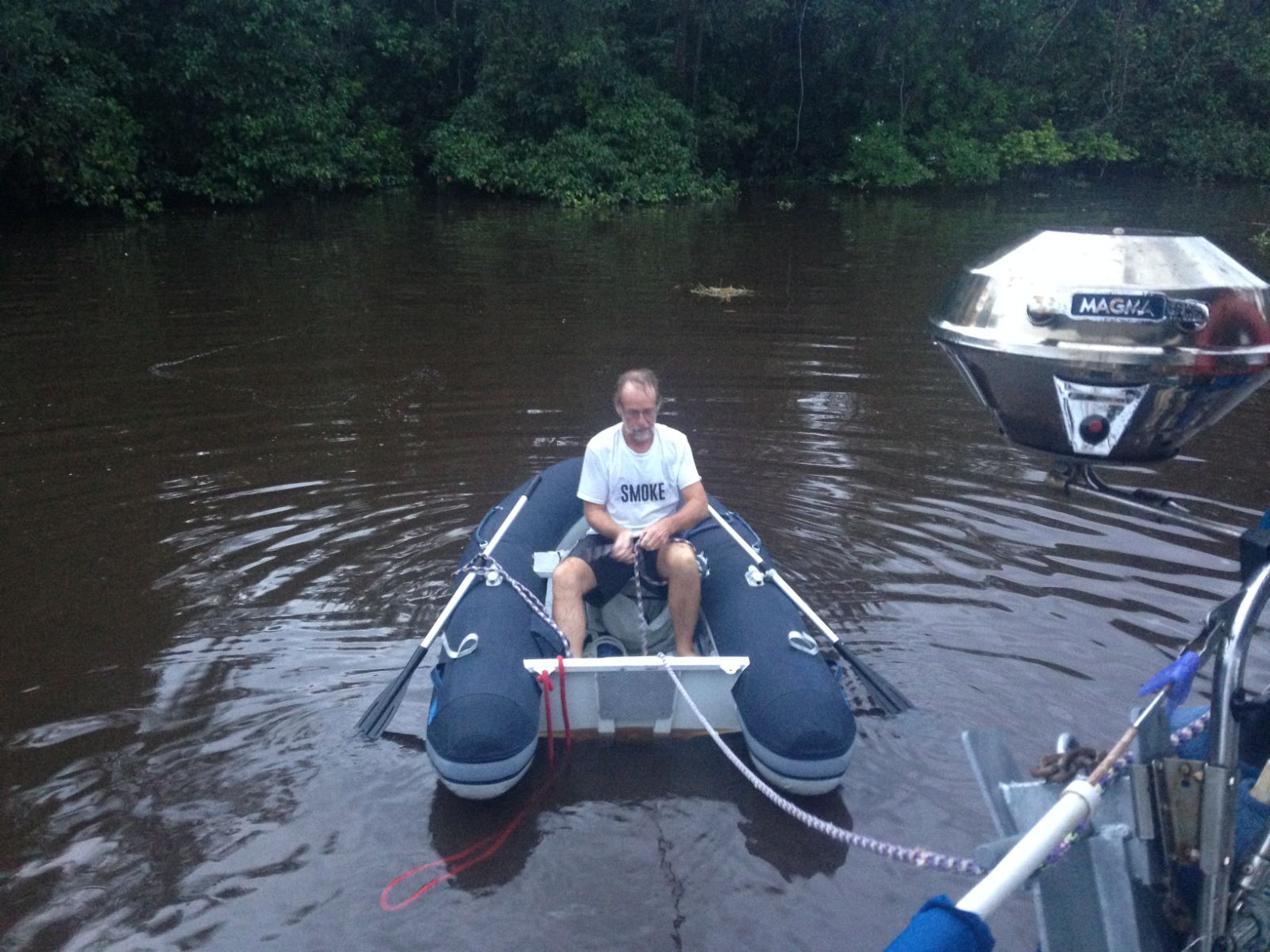
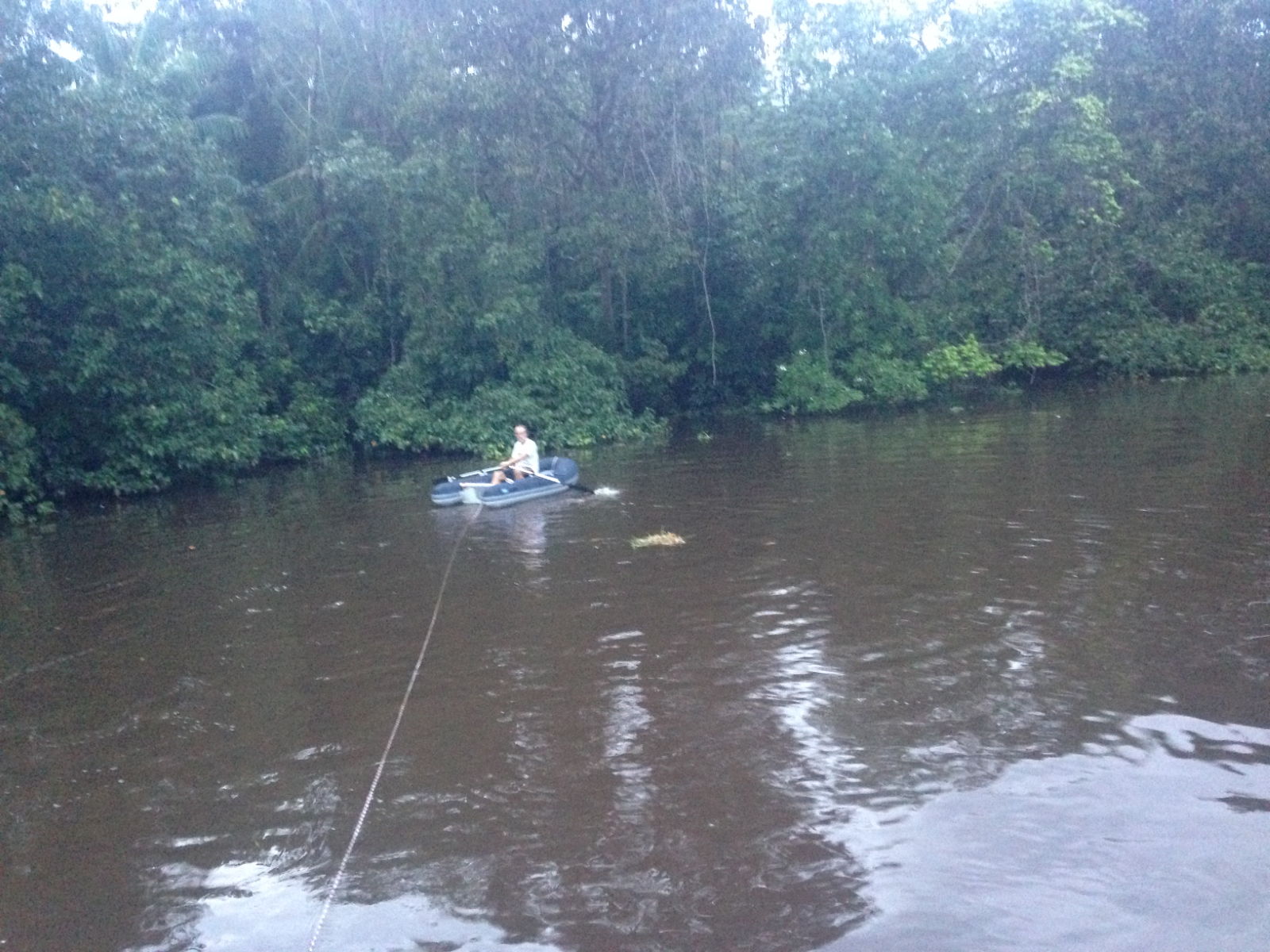
With the engine off and the water so still, the noises of the jungle were clearer than ever. Unfortunately, so was the sound of the traffic from the nearby dual carriageway from the village of Klias. It was hard to tell we were near a village apart from that because we were surrounded by thick mangrove forest. The only other clues were the ‘sunset view’ restaurants and boat jetties set up for the river tours, and these had all closed for the night. Mosquitoes would be rife here, and Paul reminded me that this environment might pose more of a risk of dengue fever… I went below and sought out more insect repellent. After dinner, Paul went above to check on our position and returned with the words ‘we seem to have backed into a tree!’ Branches were indeed touching the stern, poking eerily into the dimly-lit cockpit. Another line needed to be attached, among other tasks to sort it all out, so it was back into the dinghy with a torch for Paul, while I kept a lookout for crocs 😉 Back on board we enjoyed the night-time spectacle of the fireflies, which were like a multitude of little floating stars in the darkness.
I woke up once during the night, alarmed by a noise that was like someone banging on the side of the bow. It turned out to be the anchor, which had accrued a fair bit of the river’s floating debris and was being bashed against the side as the current pulled on it. I didn’t know until later that Paul had got up all through the night to attend to the lines on the river bank, experiencing some challenging moments at times – as described in his blog entry. The pic below shows him making ready to hack away at the debris around our anchor chain in the morning.
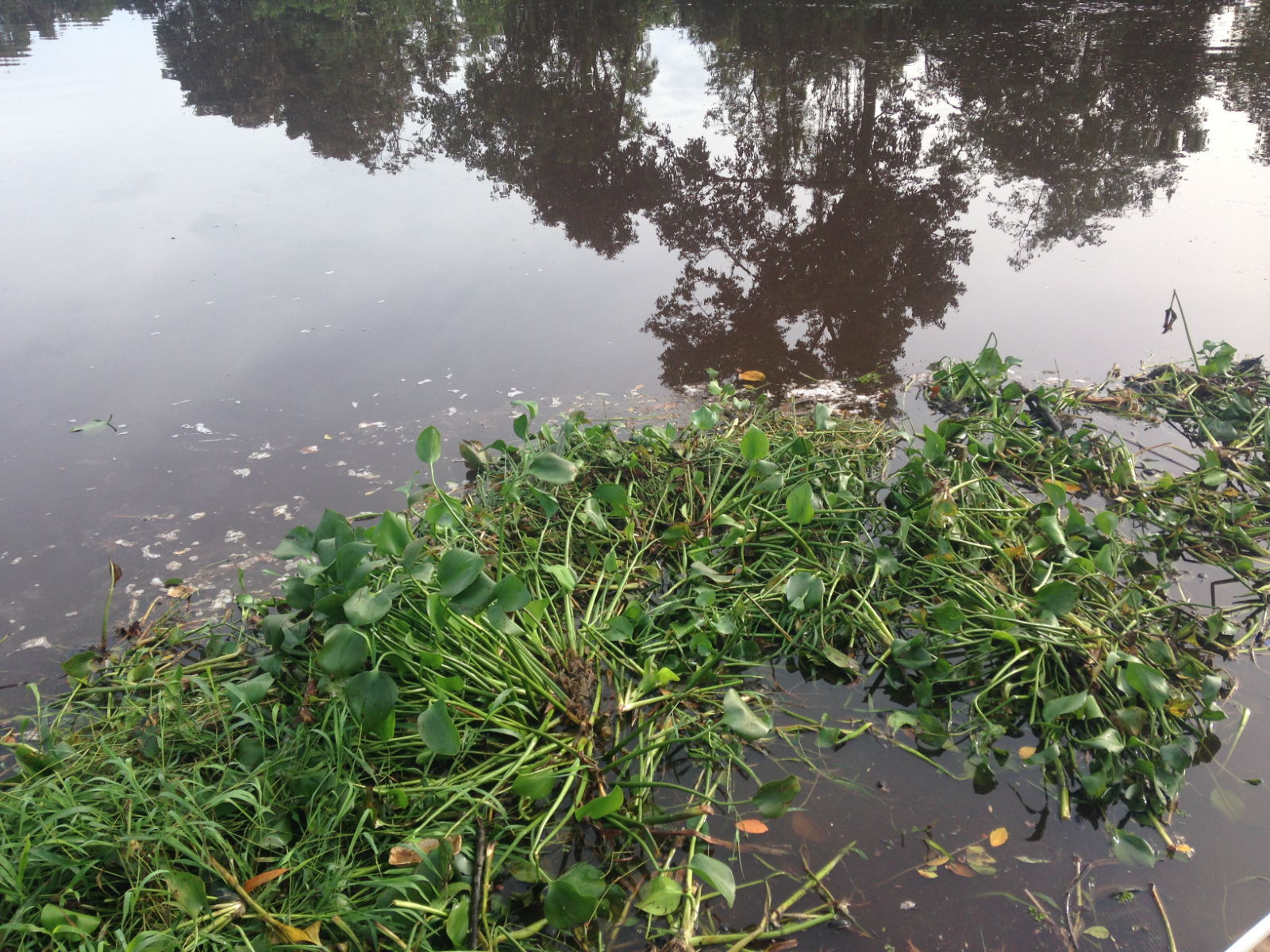
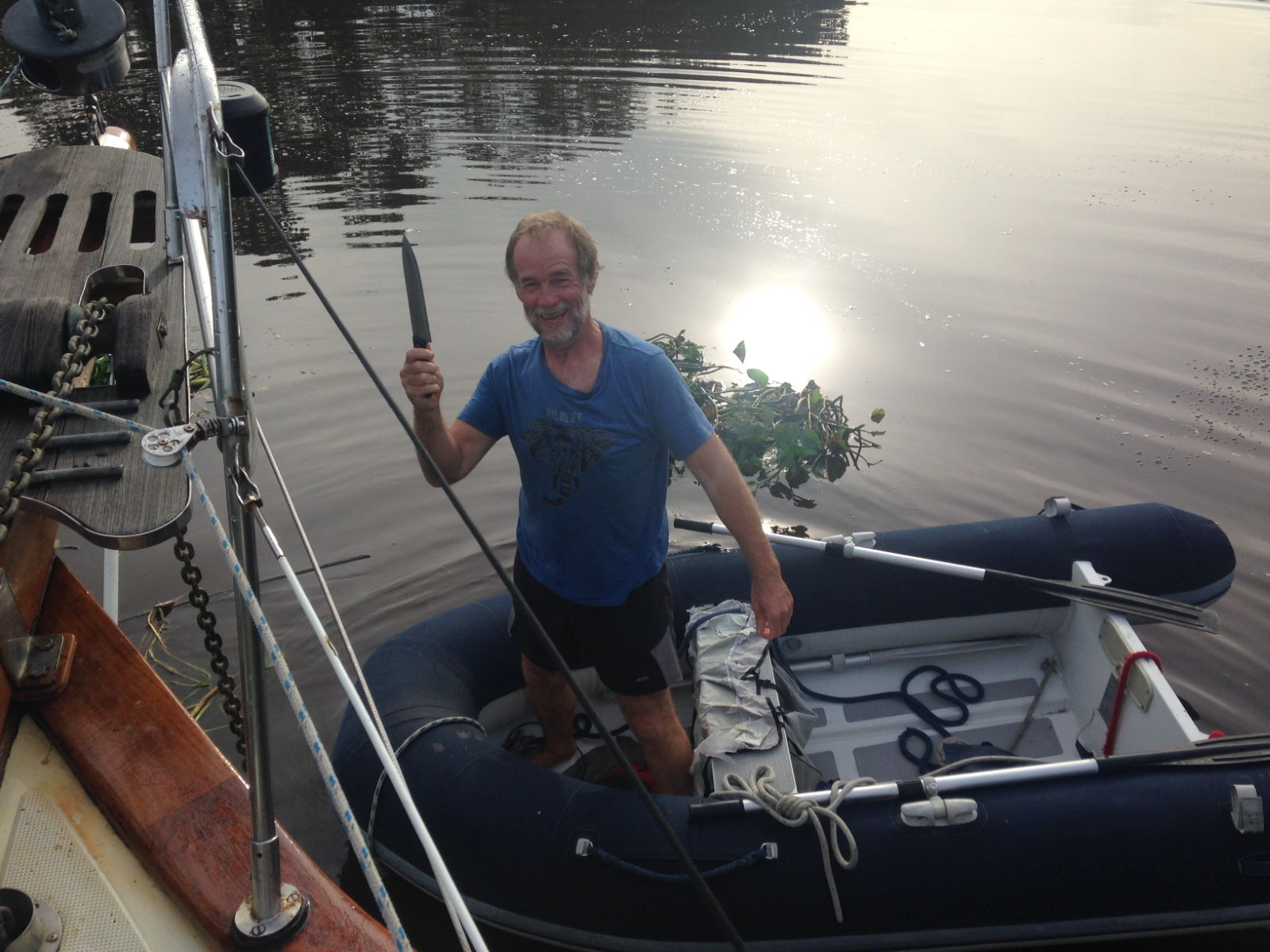
Both of us were up early enough to fully appreciate the beauty of the jungle at sunrise. For a couple of hours we sat drinking coffee and watched and listened as nature came to life around us. The monkeys were still too far away to see properly but we could see them jumping from branch to branch, while the birds communicated to each other in a stereo-like fashion. Now and again a fish jumped in the water. It was wonderful: I felt as far removed from the chaos of Christmas as it was possible to be.
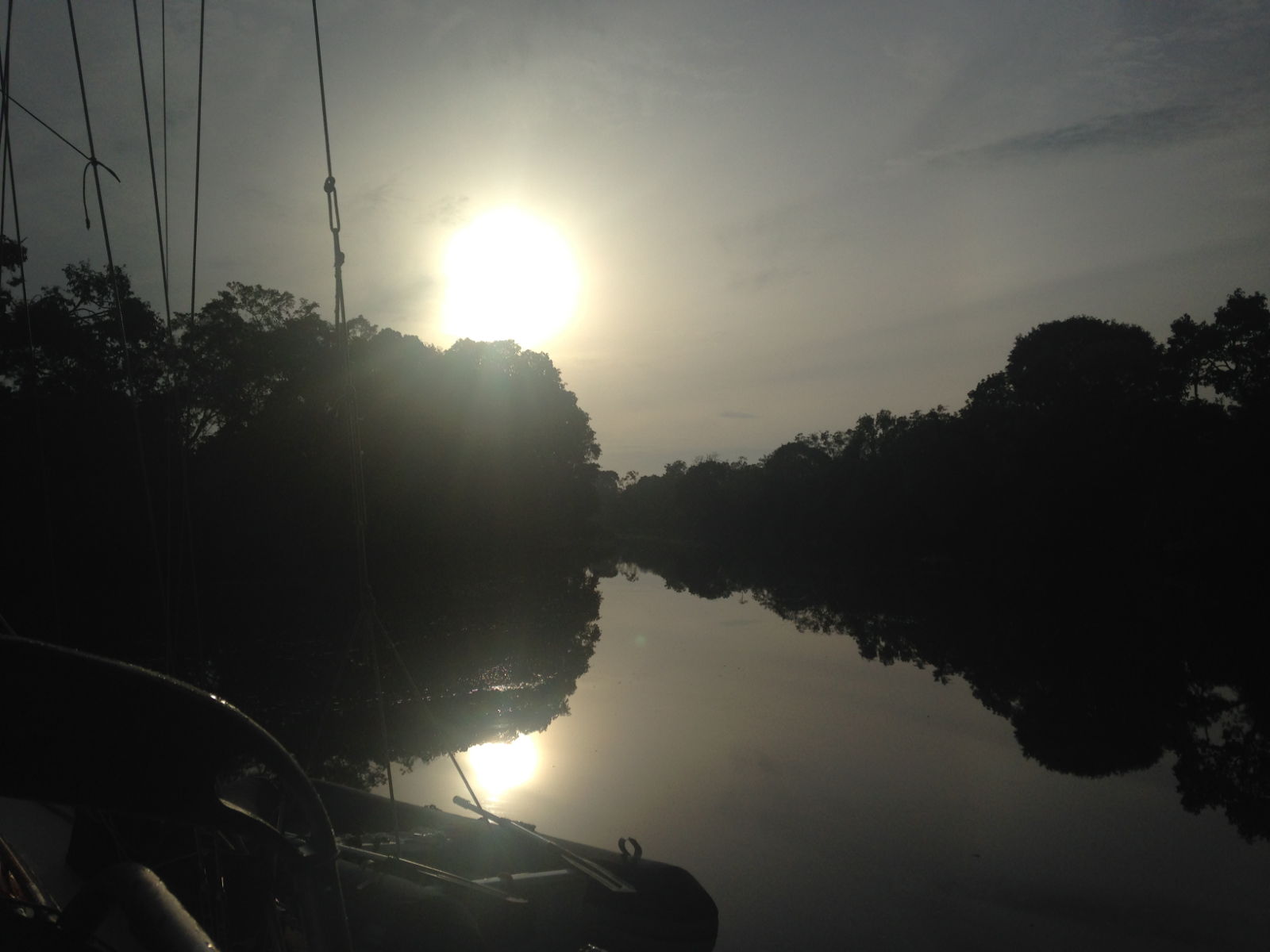
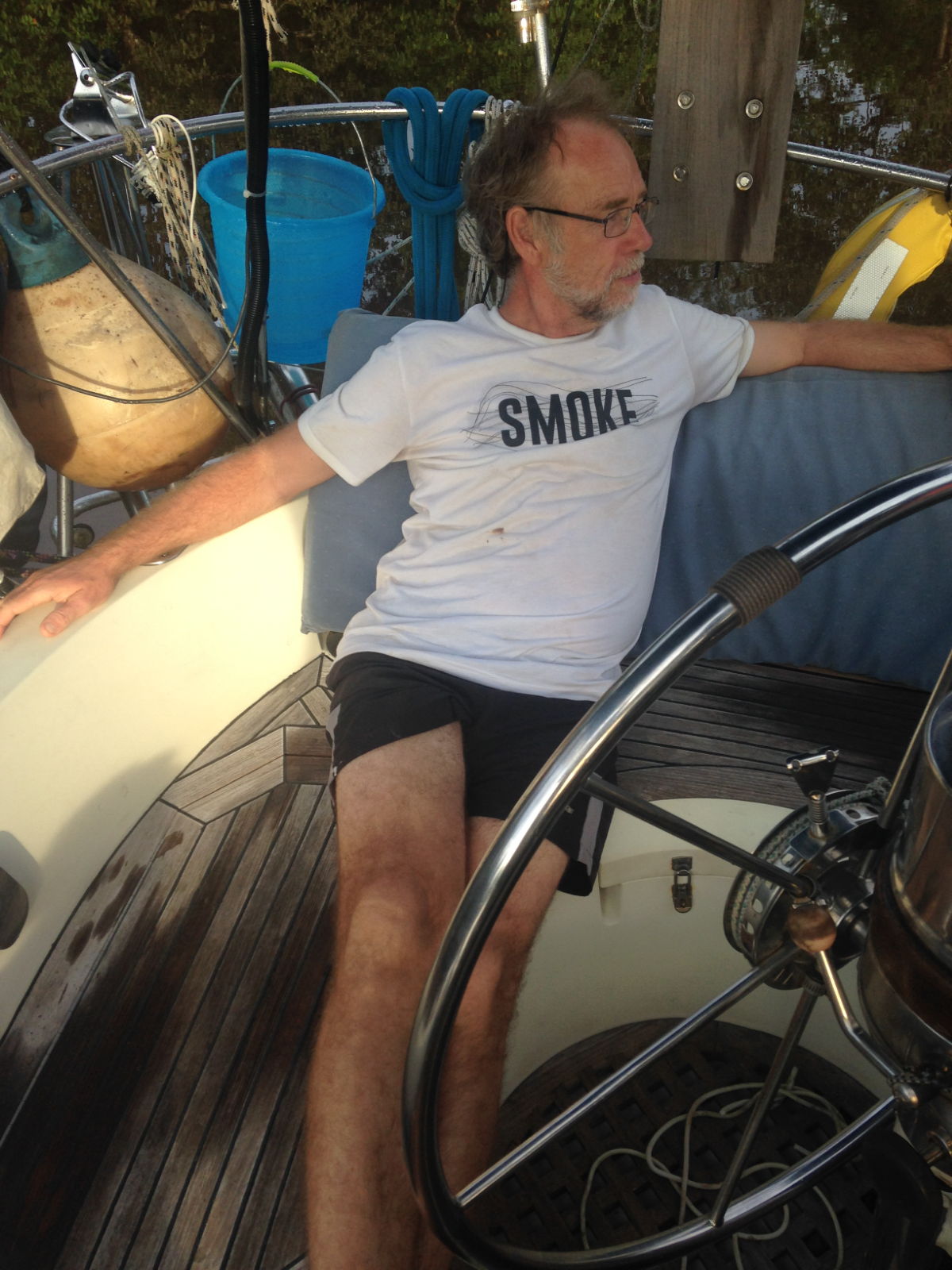
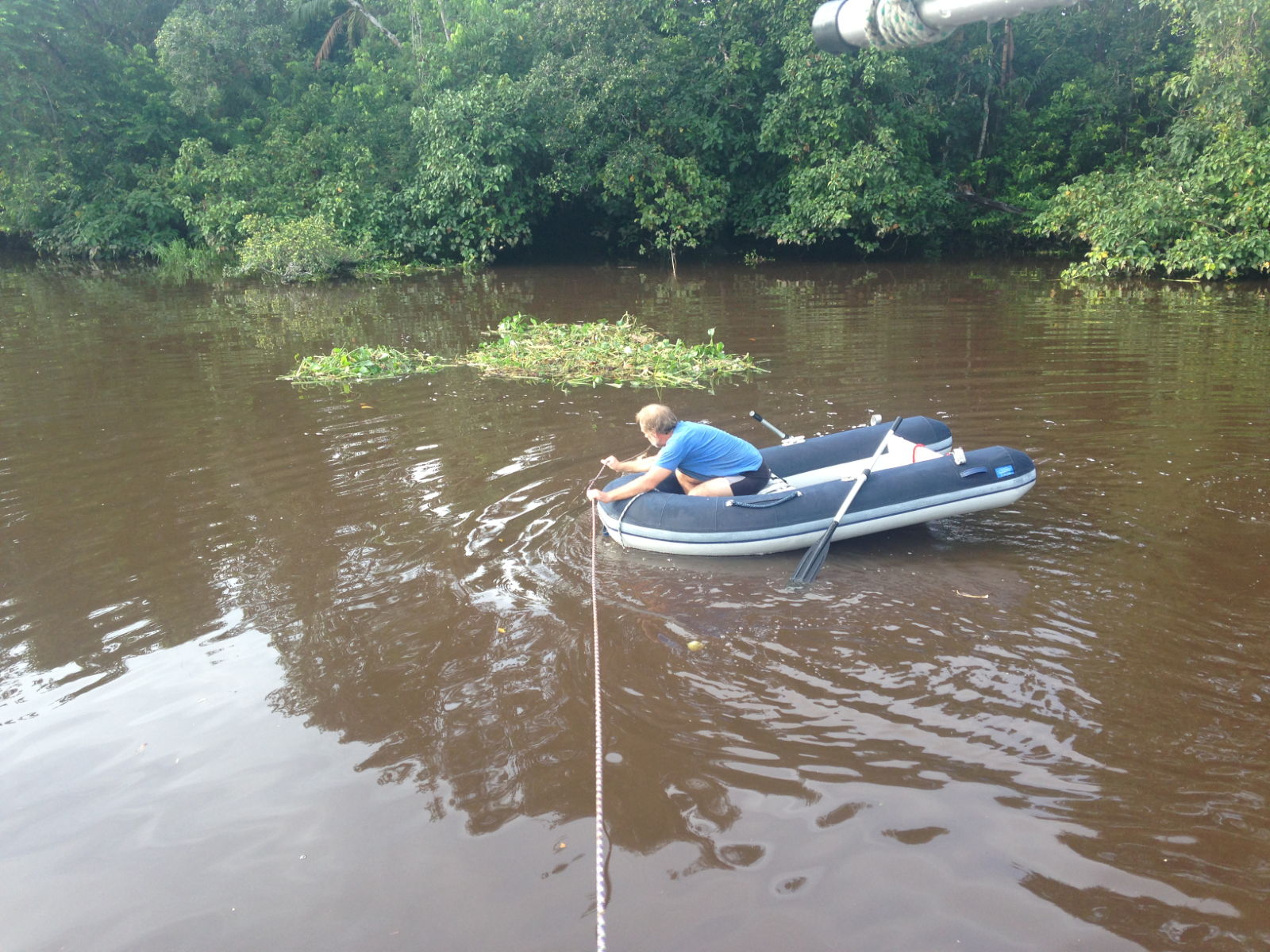
We were ready to leave at 8. Paul undid all the lines, cleared more leaves from them and I stood at the helm, ready to prevent us drifting backwards into the trees. All I needed to do in the event, however was to execute the three-point-turn we’d been practising to manoeuvre us back in the right direction. Soon we were slowly edging our way back down river, watched by a few curious long-tailed macaques. By 9 it was hot, and we hardly needed any power to move along. We let the current take us slowly, with the gear in neutral, ever on the lookout for photo opportunities.
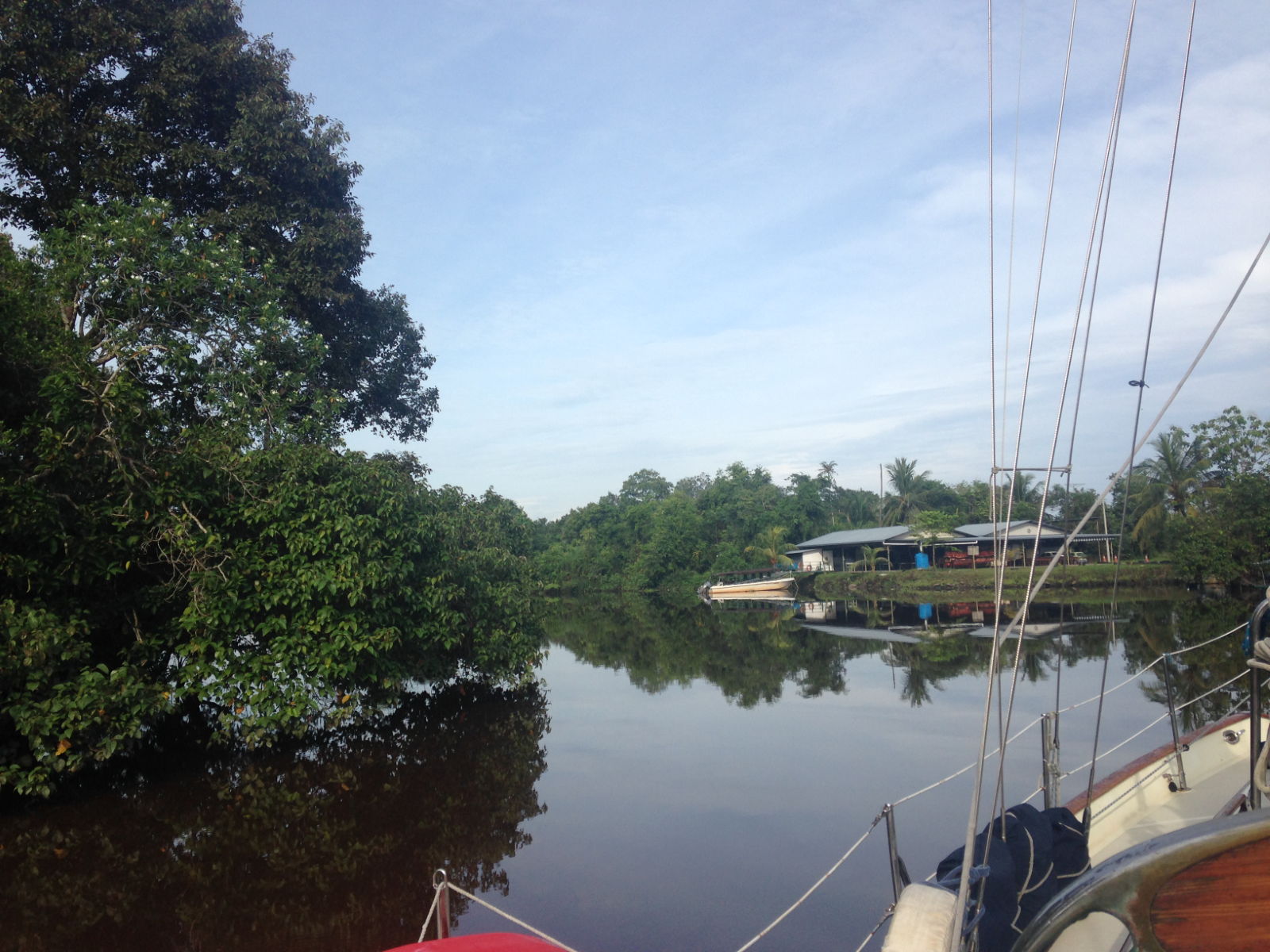
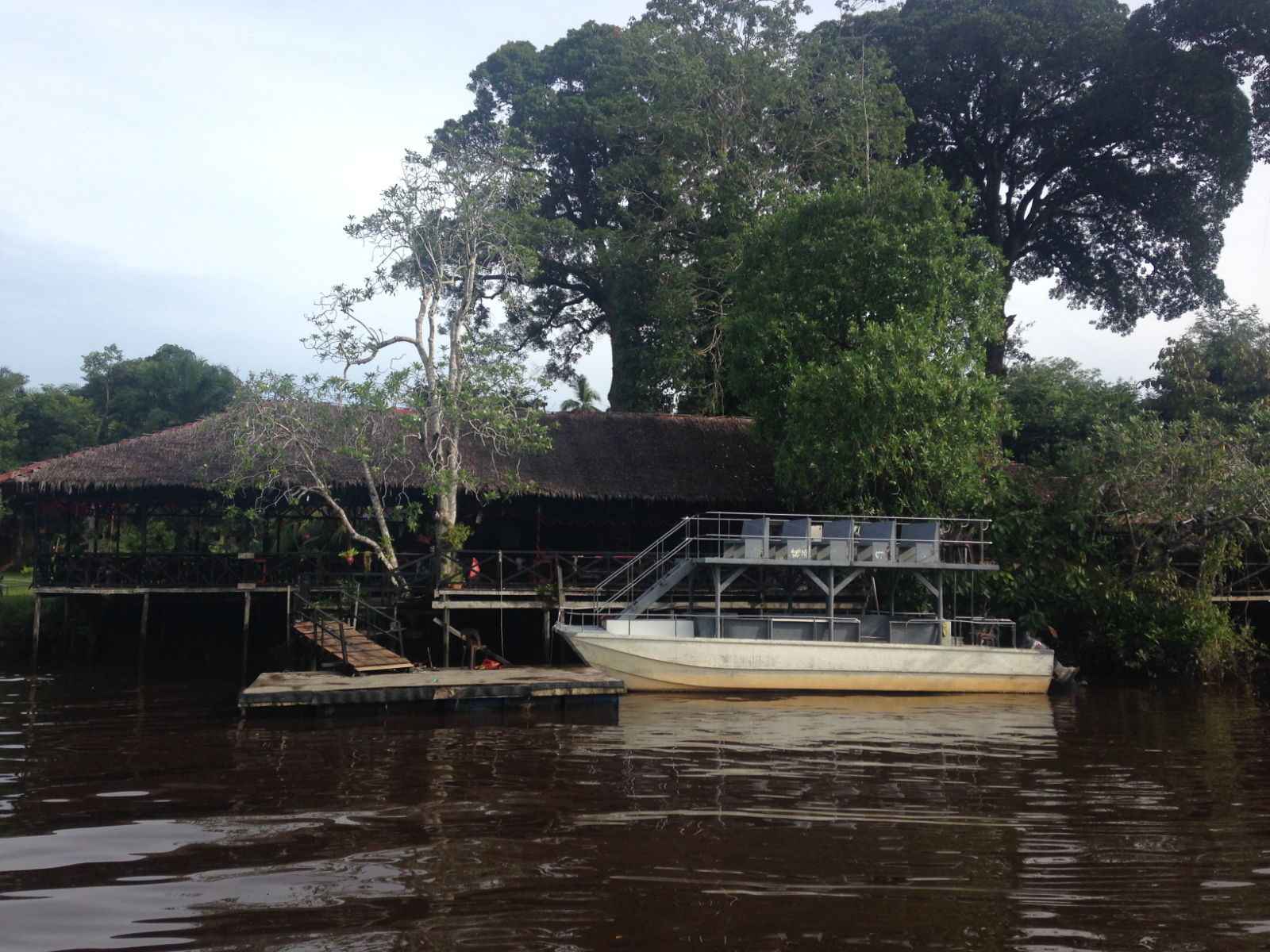
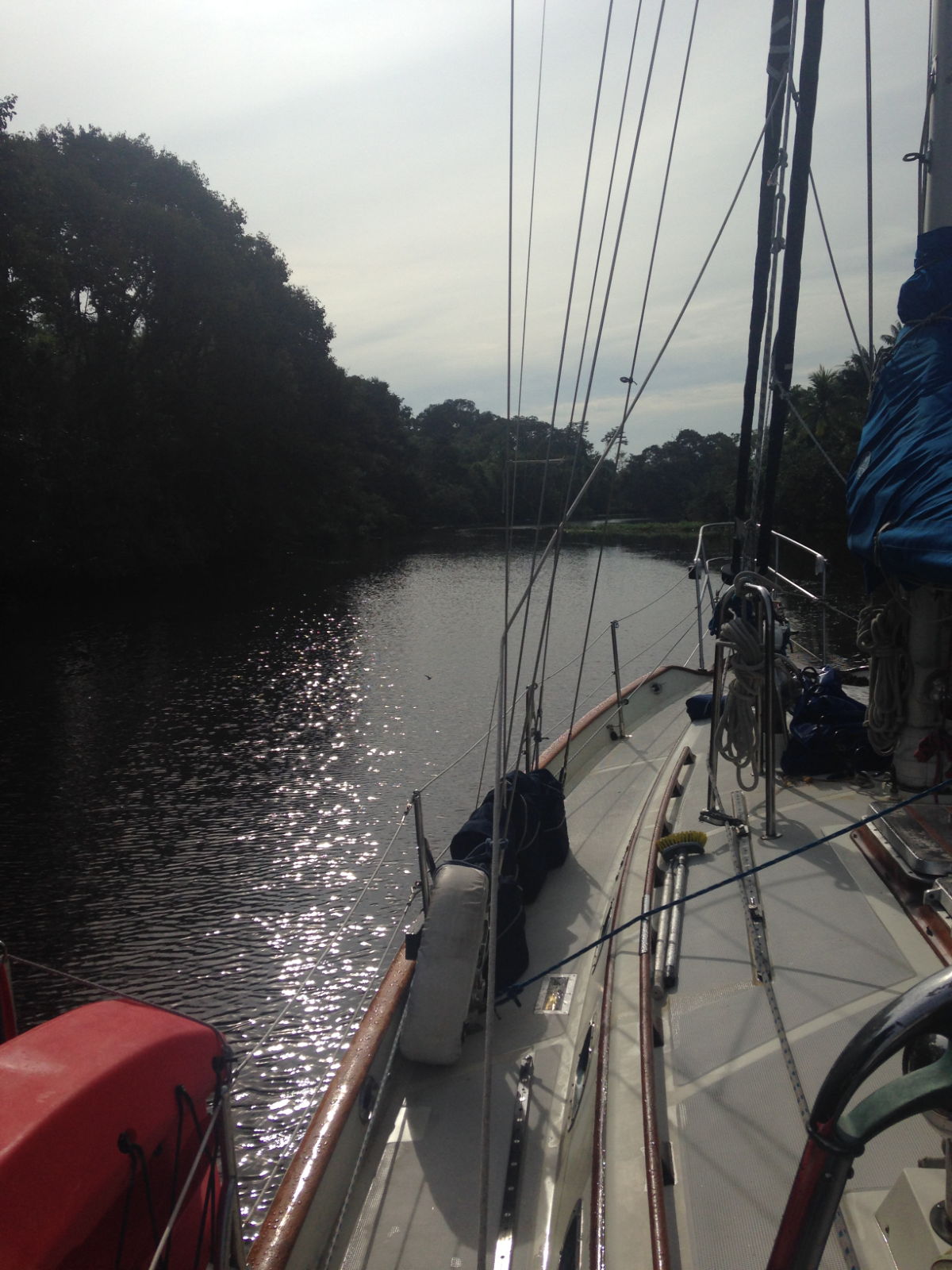
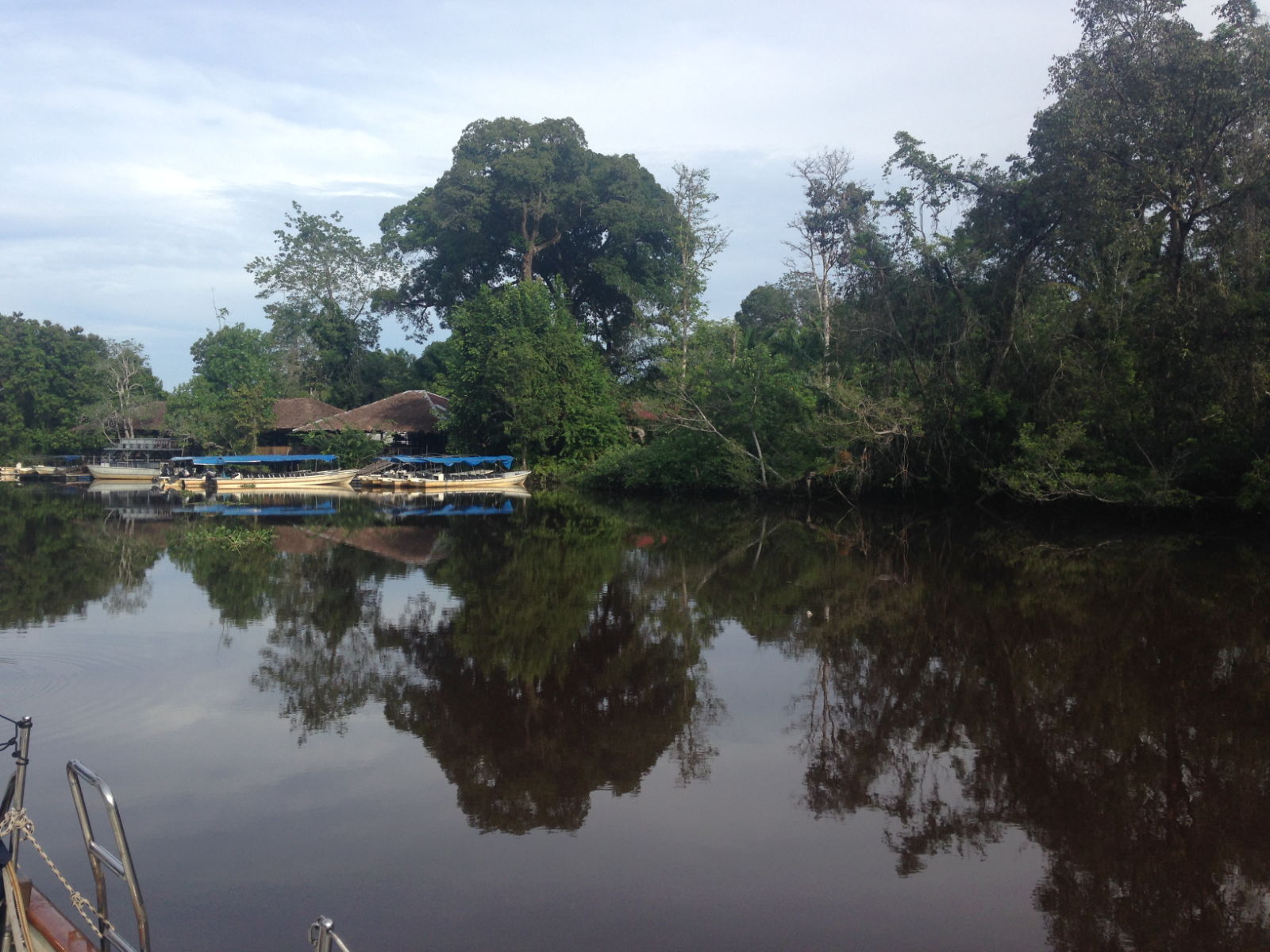
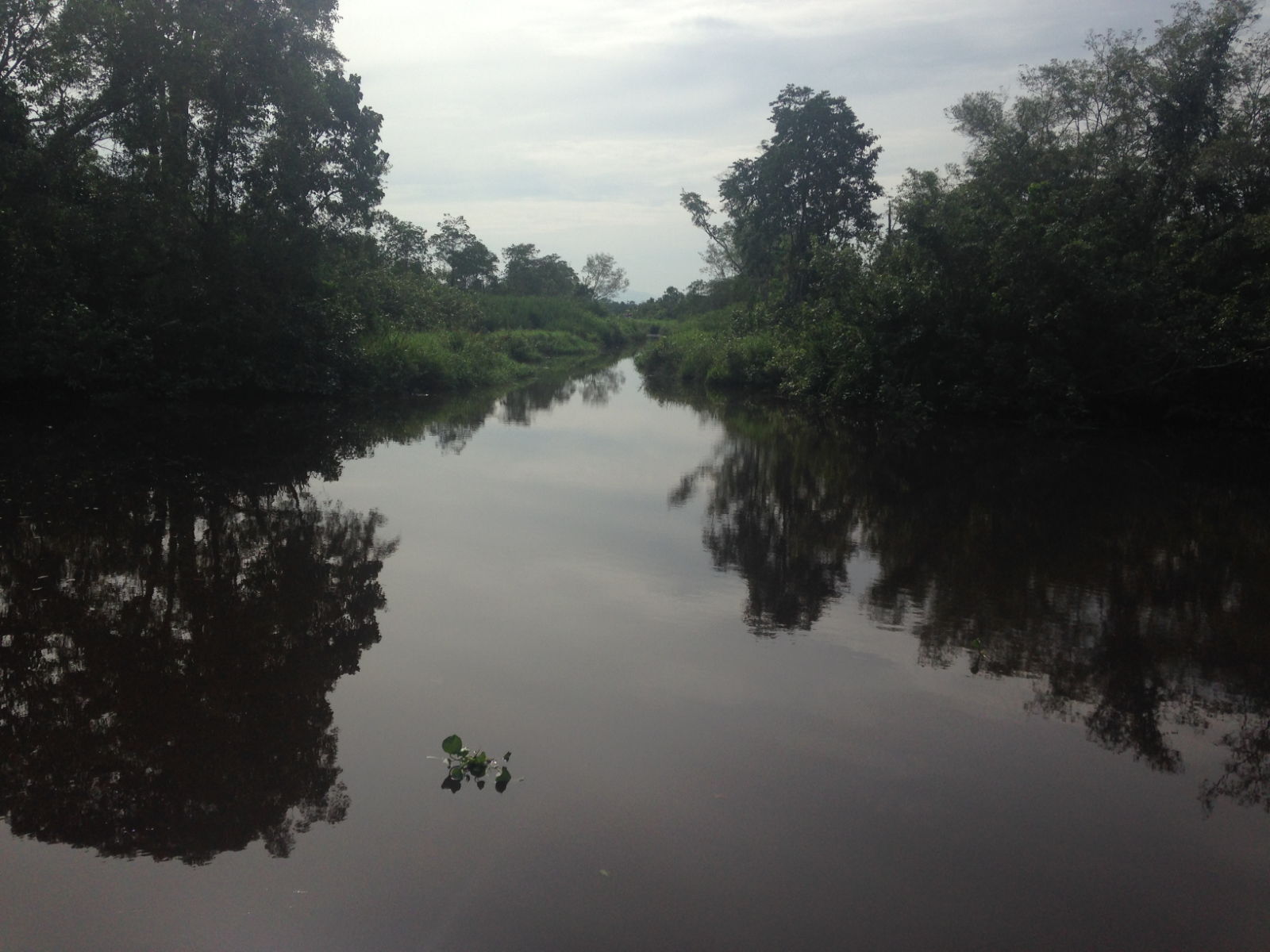
At the observation point we dropped the anchor to have a late breakfast, and to take a closer look at the viewing platform. It was reassuring to read the information boards (pictured below). We didn’t see any of the creatures listed but it was great to stand there in the silence and take some pictures.
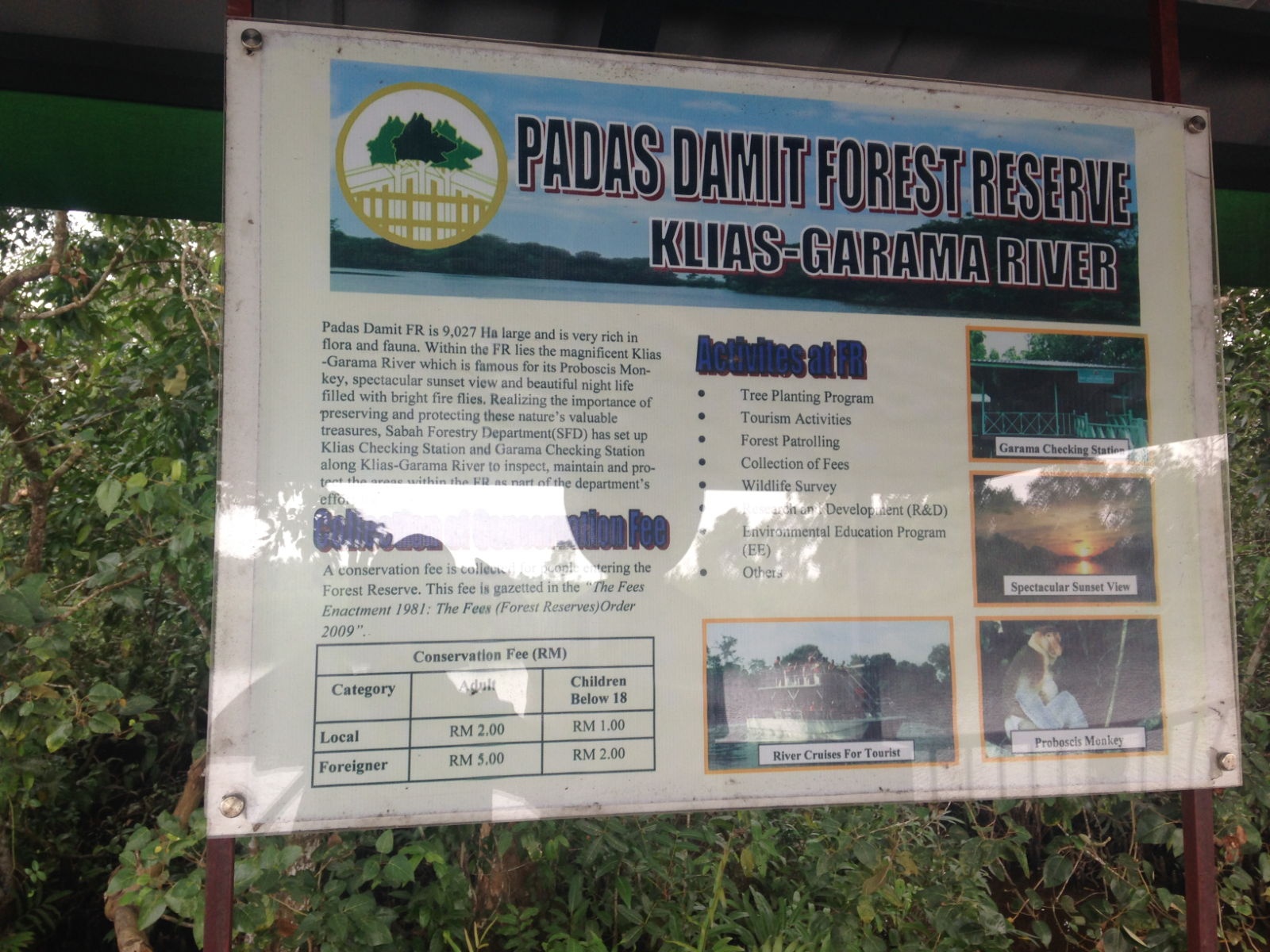

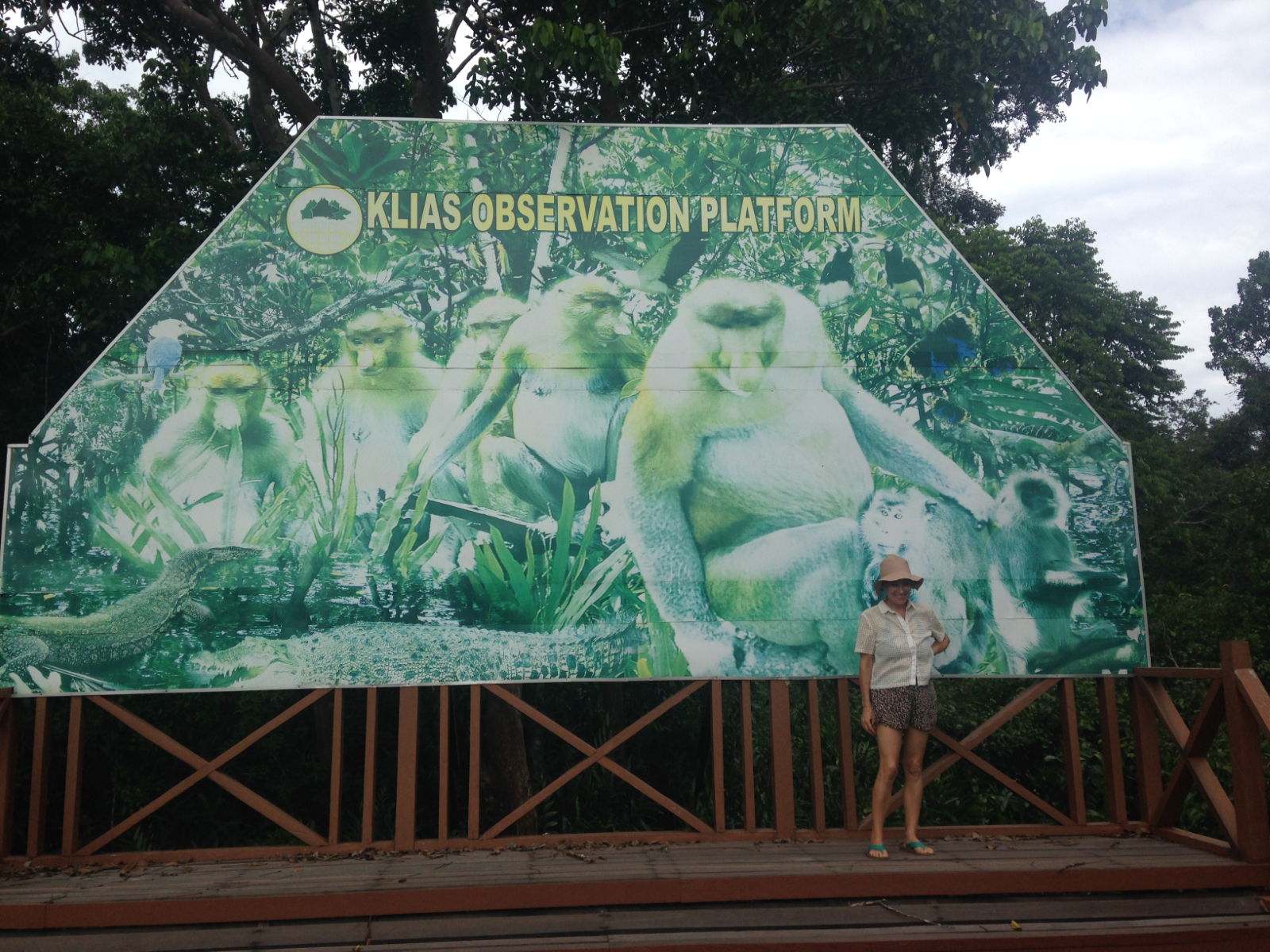
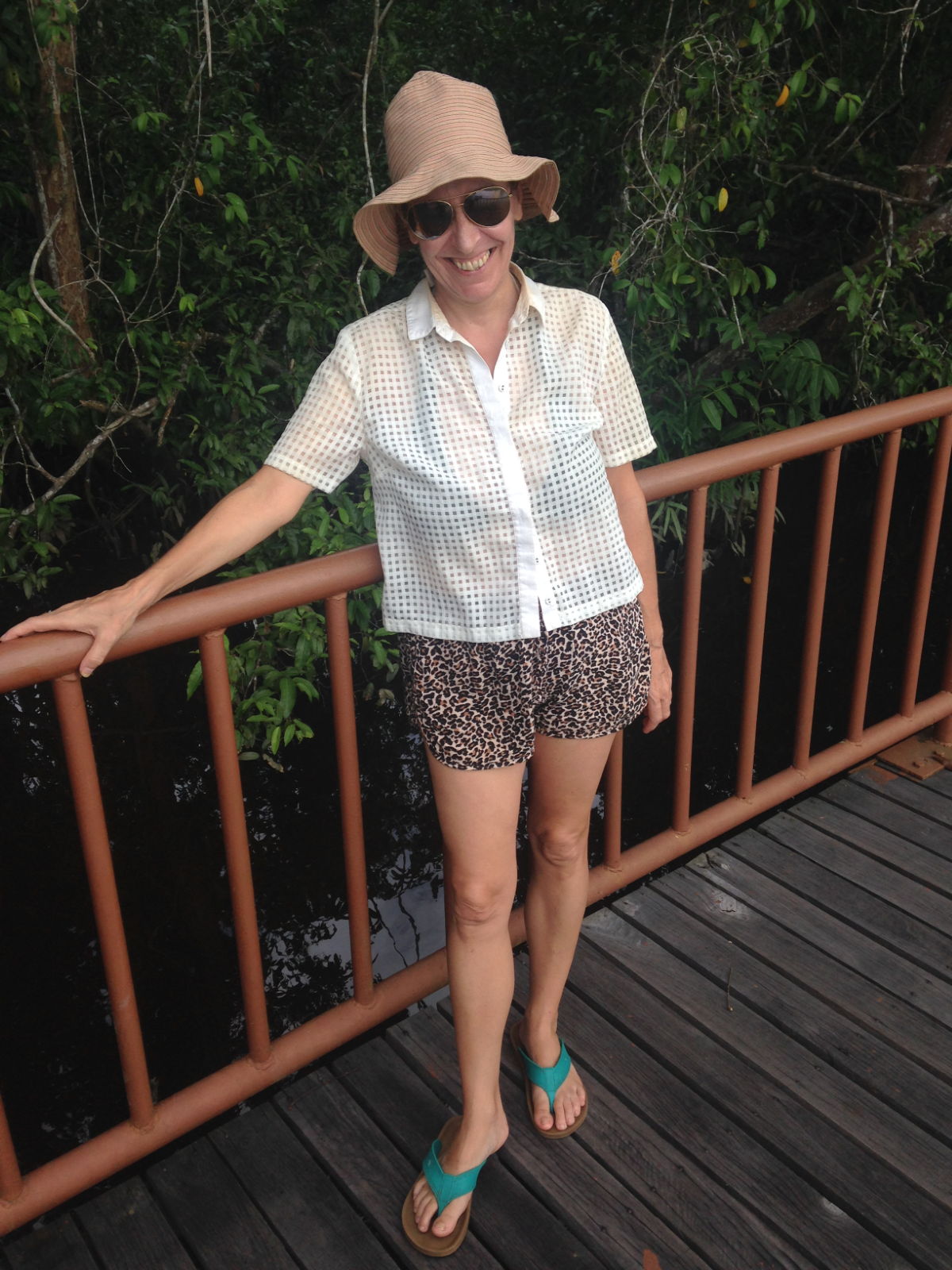
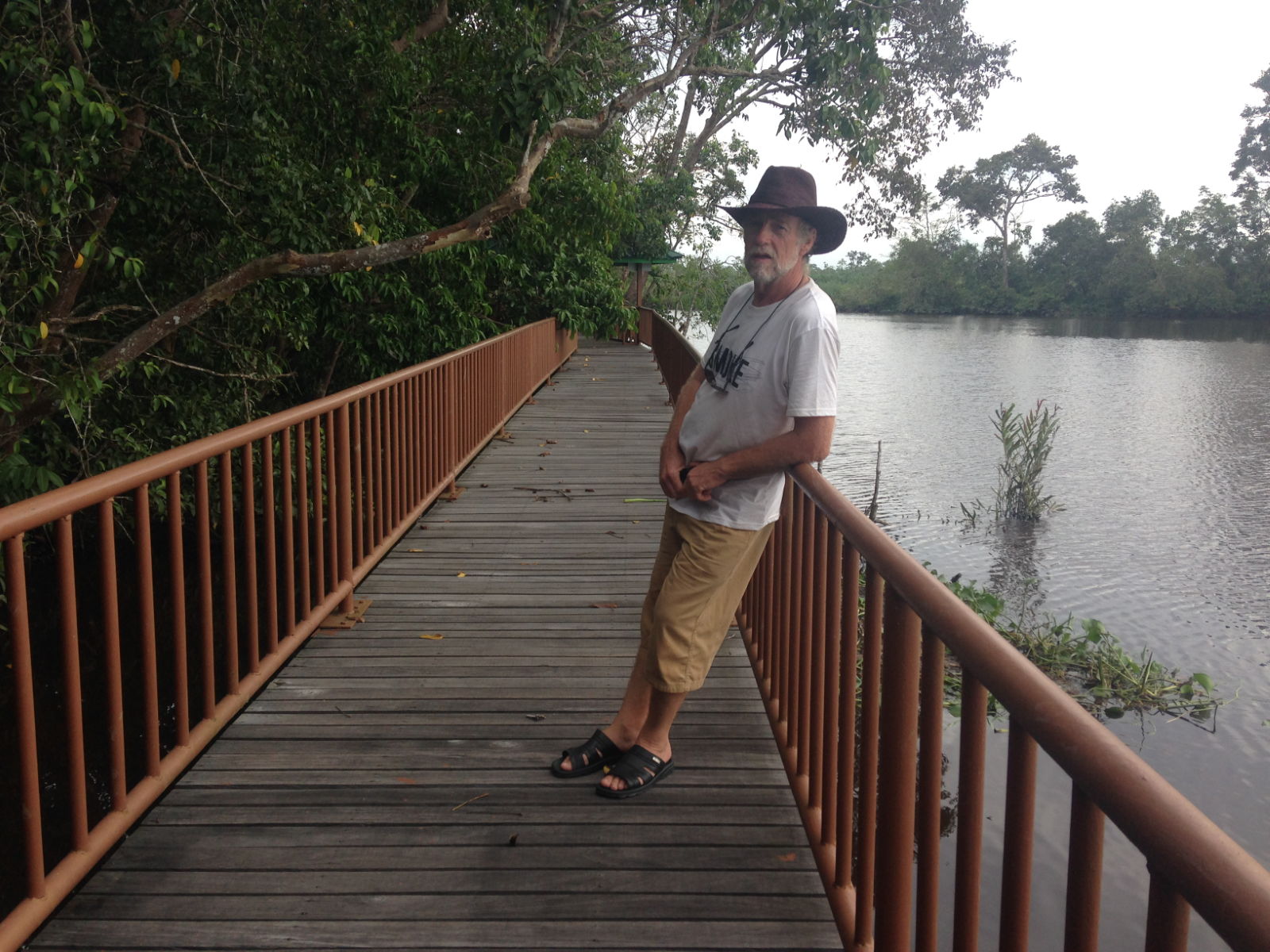
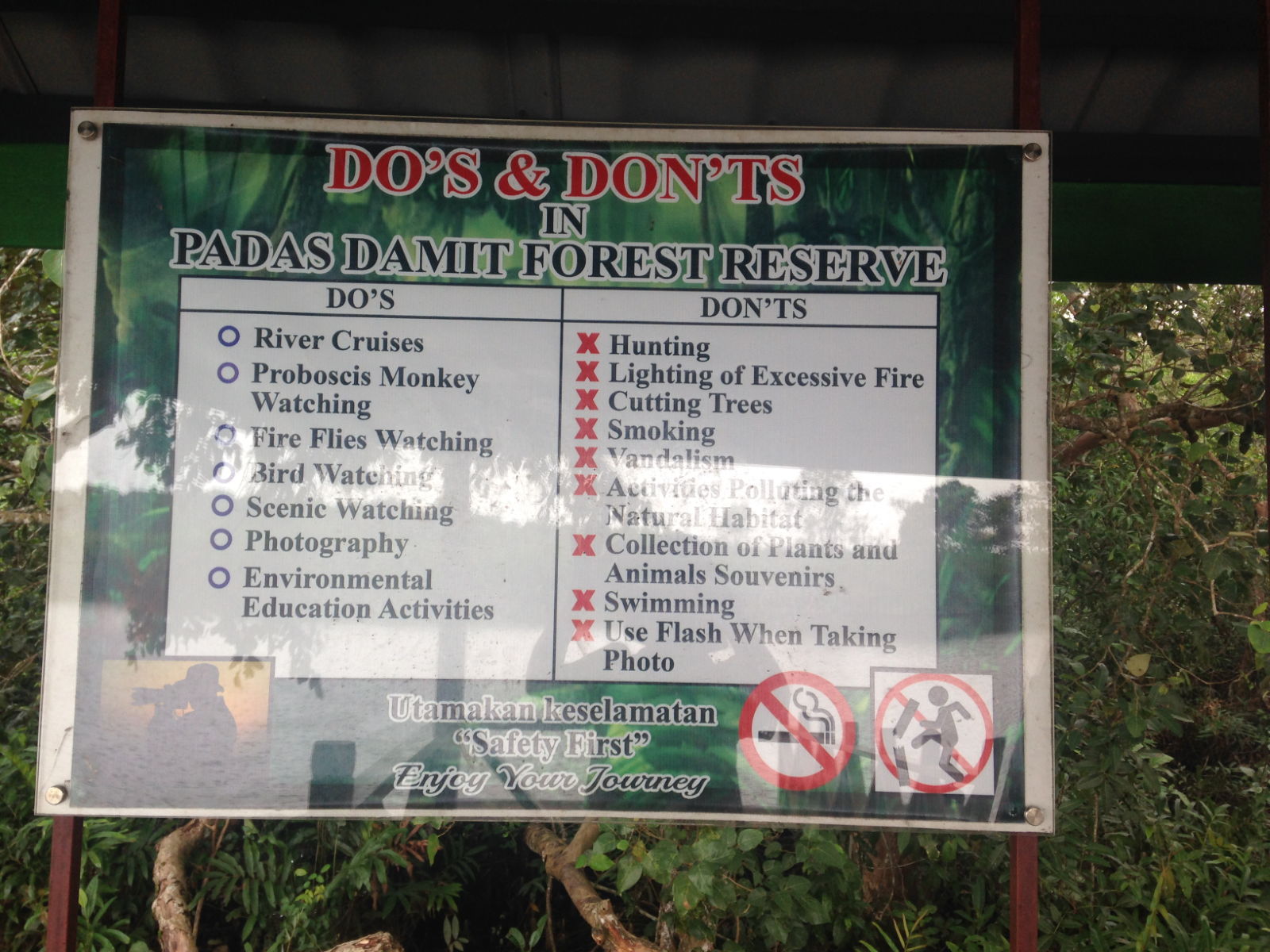
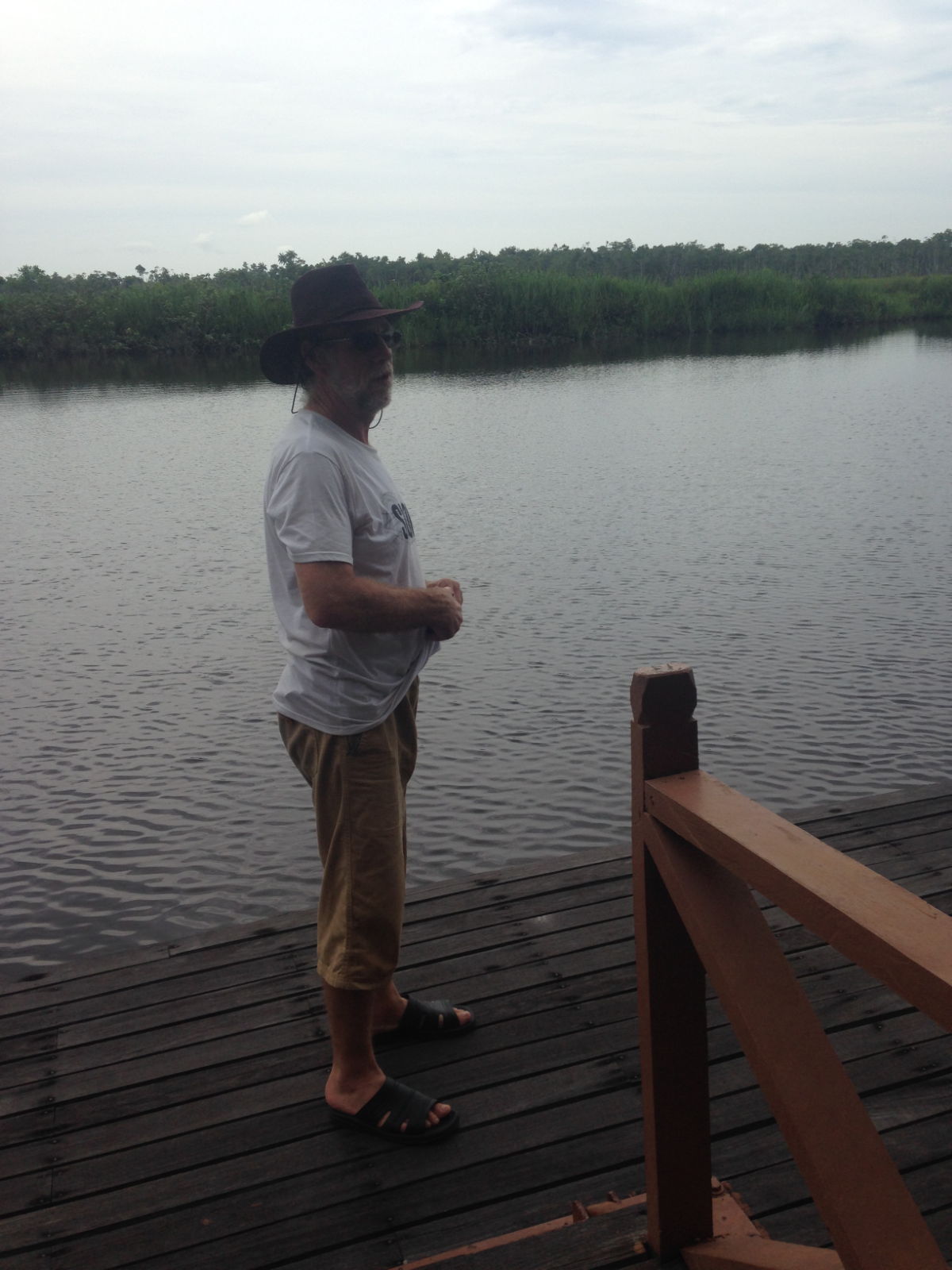
Our next anchorage was in a much wider part of the river. As we were now further away from the tourist area, there were fewer boats and it was even more peaceful. The flying ants we’d been warned about came in droves at dusk. They were everywhere! Tiny and harmless, but disconcerting nonetheless to see so many flying, jumping and crawling around us.
Saturday December 16th
Paul got up early to have a morning row in the kayak and when I got up to have a look I could see why he’d felt drawn to do so. It was glorious! Cool, sunny, a clear blue sky, calm water and the only sounds, the jungle chorus emanating from the riverbank’s trees and mangroves – just waiting to be explored. I stood in the cockpit for a while watching Paul drift in the current on the edge of the mangroves. No wildlife spotted but a real balm to the senses.

He enthused about the detail in the roots and branches of the mangroves and it was good practice in the kayak (something I’ve yet to attempt). We cruised on down the river, stopping at one point to let the current carry us in silence. Monkeys were definitely further back in the forest and we hoped they might venture out if it was quiet. They weren’t to be fooled, however. They simply climbed higher up into the leafy branches of the trees, visible intermittently in the gaps or when they jumped from one tree to another. At 1pm we anchored for the final stop before heading back to the river’s mouth. Paul went for another kayak to check the area and when he returned we both went out in the dinghy so that I could see the mangroves up close. They were well worth seeing. The pics below show better than I can describe what we saw when we took the dinghy along a tributary. The tranquillity and ambience you’ll have to take my word for.
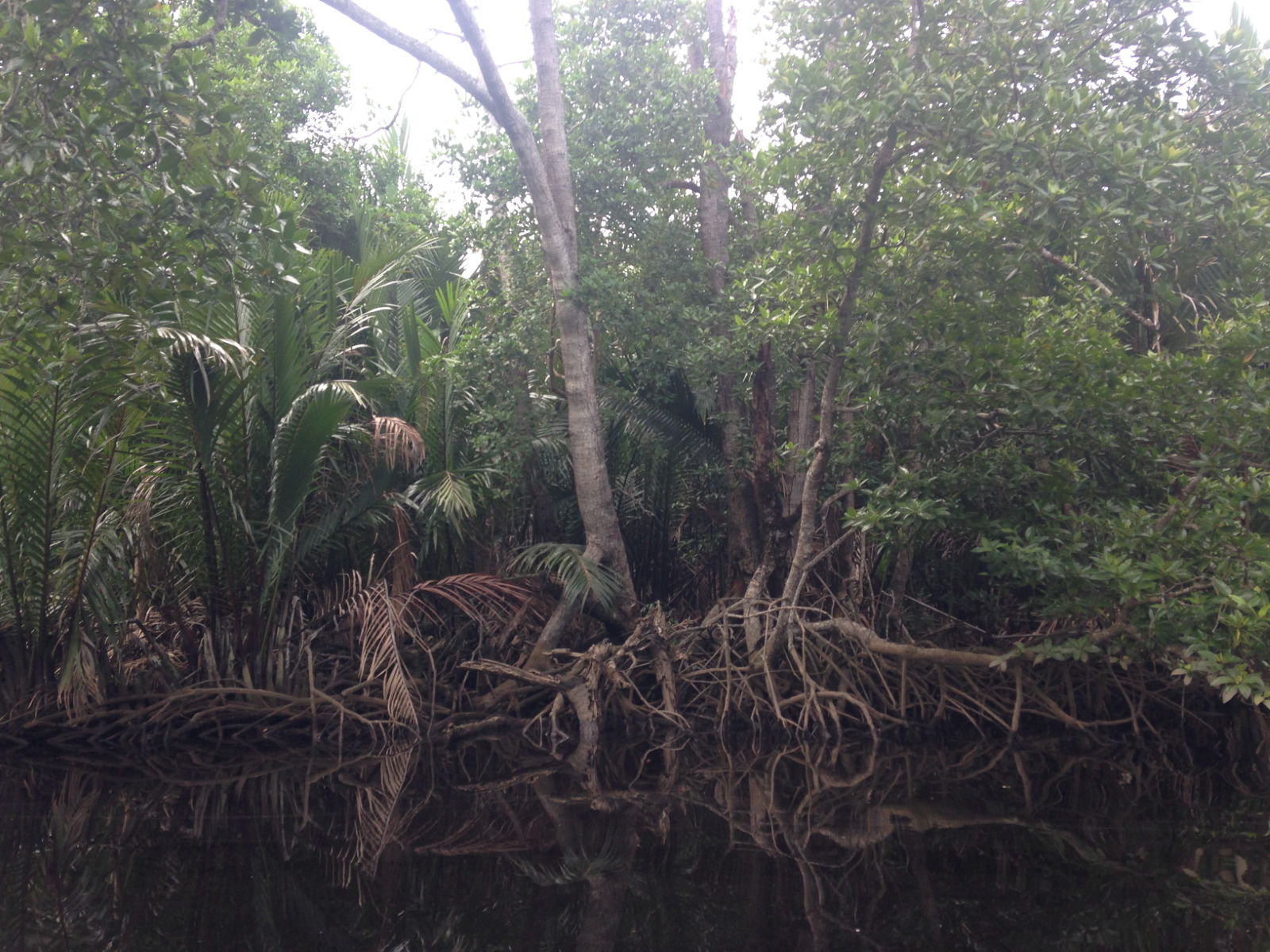
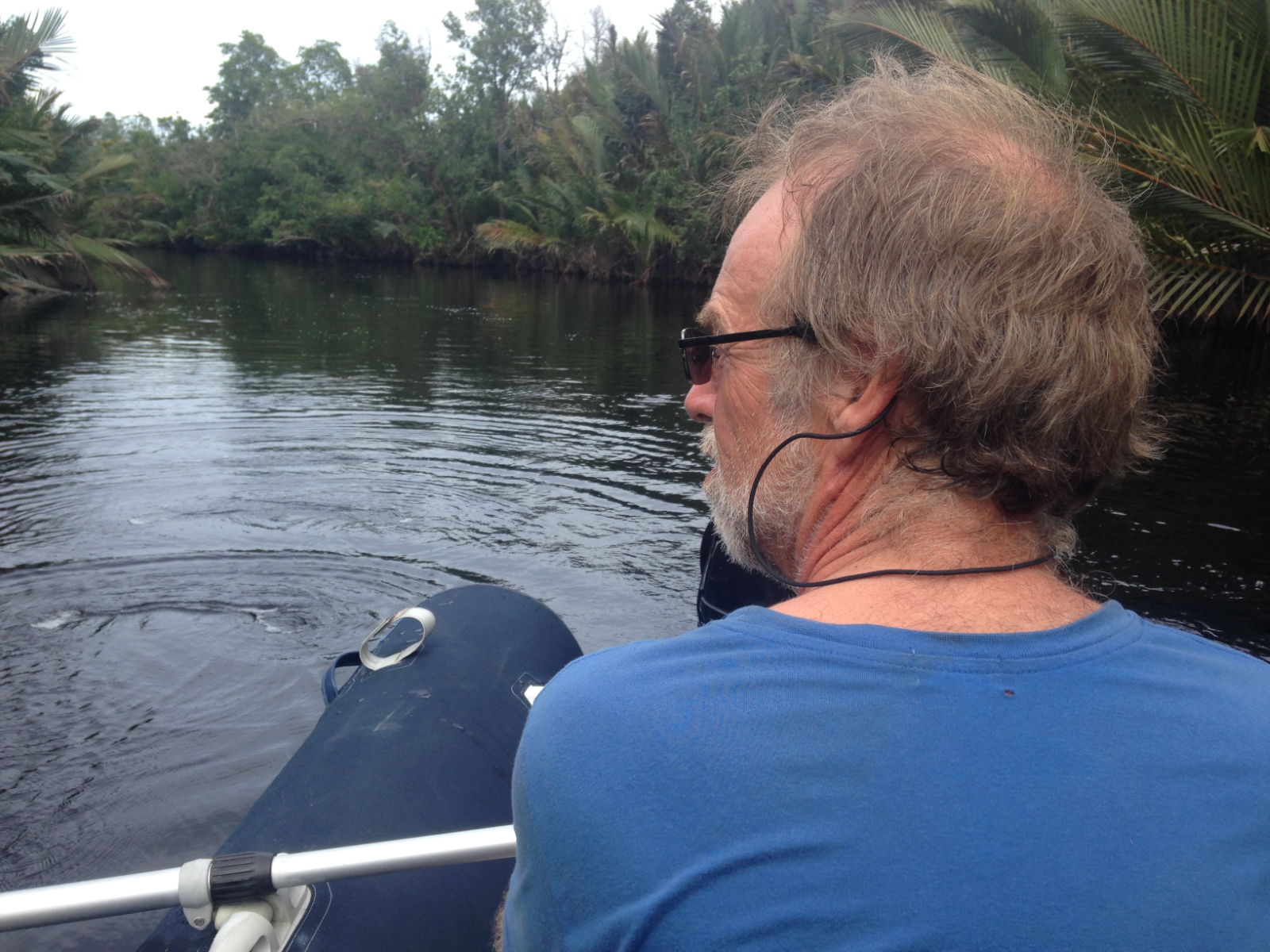
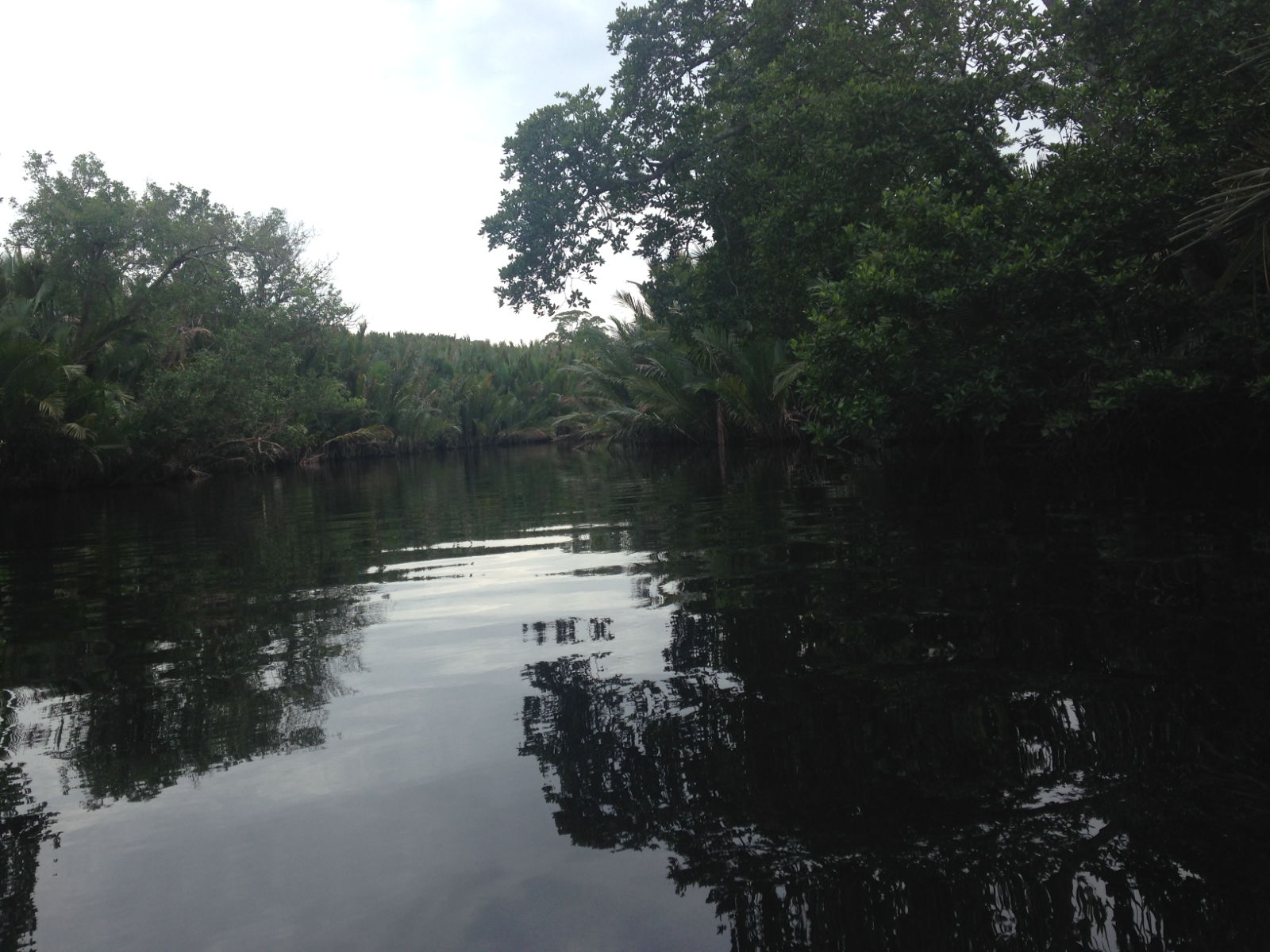
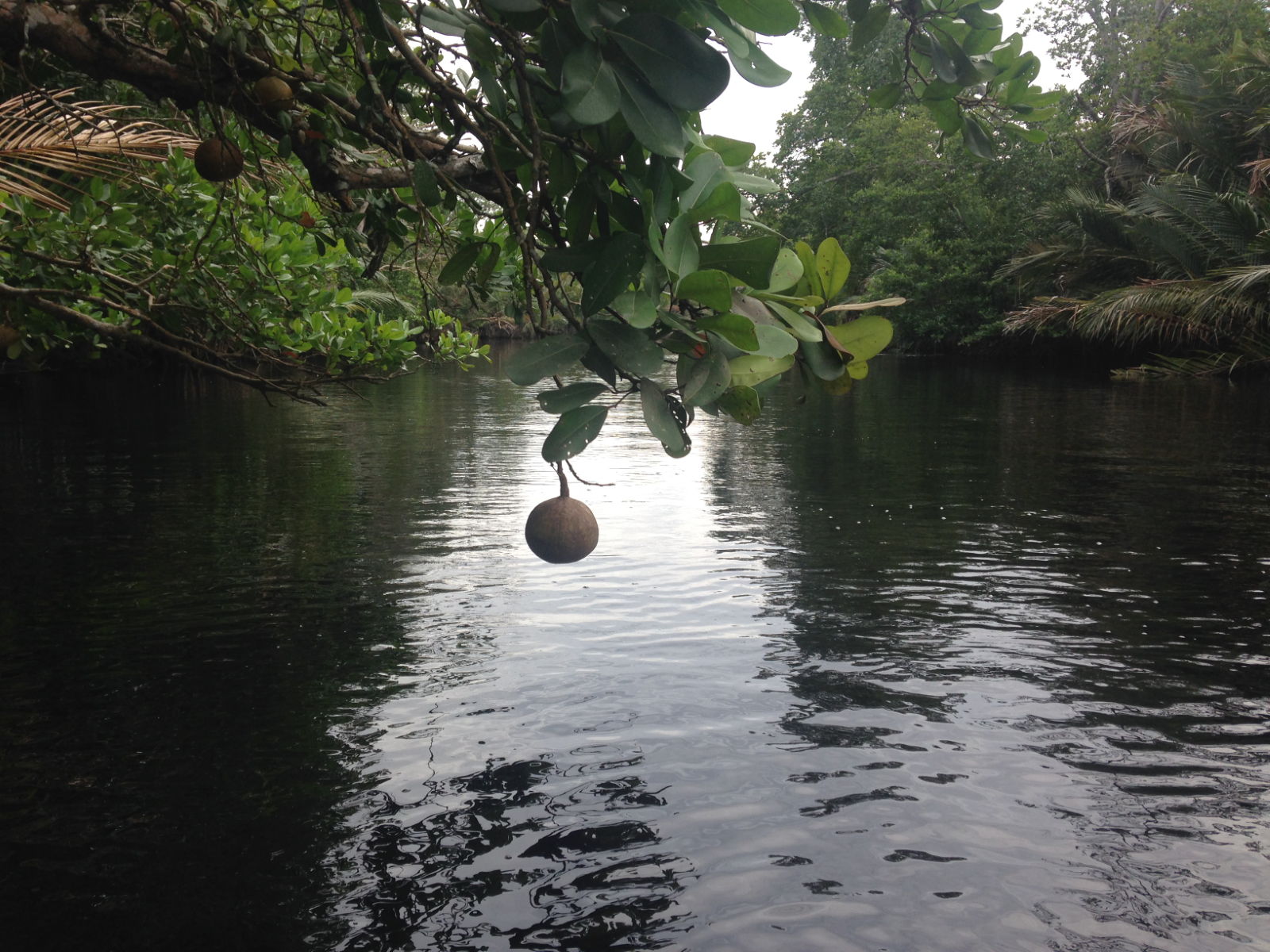
Lots of large, buzzing insects were around and were keen to explore the boat. It was hard to tell if they might sting but I dodged out of their way just in case. It led us to carry out a task that had been on the list for a while: to fix the wire mesh in the windows and hatches. They are virtually insect-proof now.
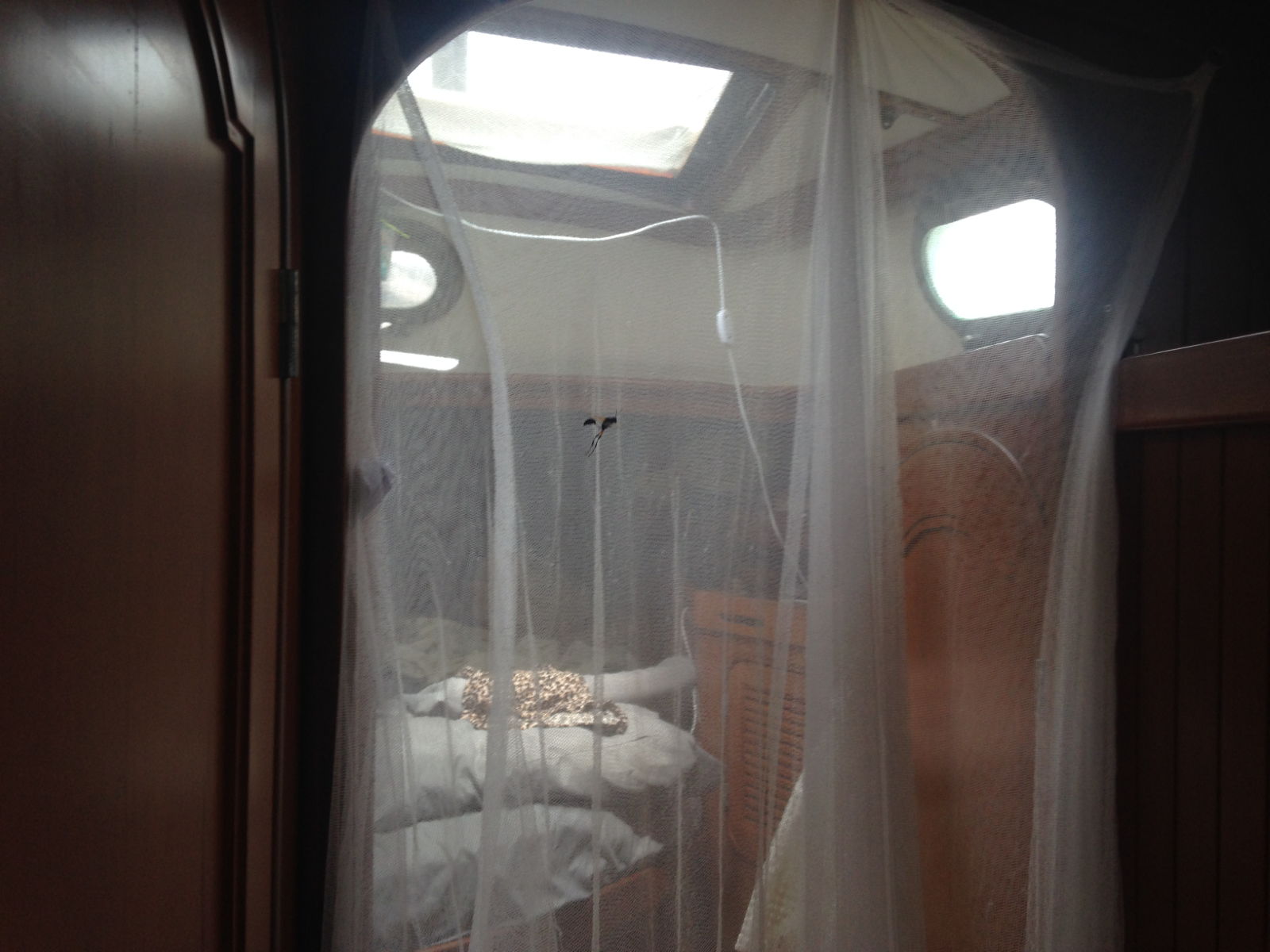
Our final night on the river was a rainy one but caused a welcome cooler temperature. Our soft drink supply was running low due to the amount of cold cans we got through in the heat of the day. We were up by 7 30 and on our way an hour later. I effected another three-point-turn out of the tight spot while the rain pelted down. The wet weather continued for the whole passage to the mouth of the river where we anchored just out of the swell. The wind picked up, and combined with the rain it made us feel cold at times – which is a novelty here. We would be heading to Tiga the next day, an island recommended to us by John and Carol in Miri. After that, it would be time for our Christmas in the Tropics in Kota Kinabalu. I had loved the sojourn on the Klias River and even though it was a shame I didn’t manage to get clear picture of the proboscis monkeys I’m glad I saw them, albeit from a distance. Here is what they look like, courtesy of the internet library.
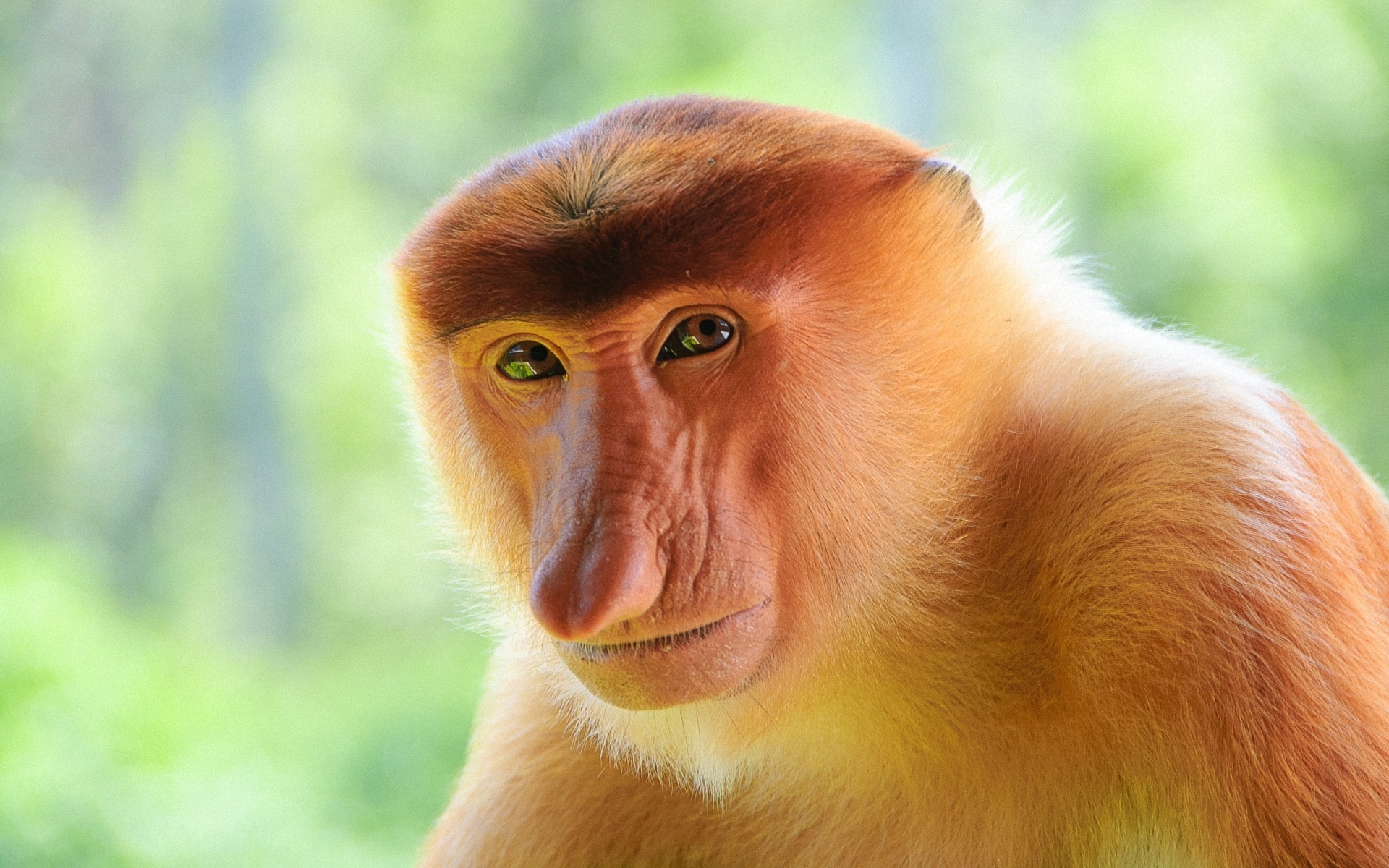

Because who dosent carry round carbon paper with them lol! Wow it all sounds so amazing, waking up to jungle noises, just looks like paradise xx
That river trip sounded amazing, although, from reading Paul’s earlier blog, a tiny bit creepy. great photo’s and lucky you escaping the Christmas mayhem. Loved the picture of the cat. x x.